#Noah and Adam are the Same but different
Explore tagged Tumblr posts
Text
Hörk- Nolin Parallelen!
Es ist erschreckend wie ähnlich sich Noah und Adam sind.
Song: House on Fire - Rise Against
Wenn jemand noch mehr Parallelen findet, gern her damit.
#schloss einstein#tatort saarbrücken#nolin#hörk#Spatort#Nolin hörk Parallelen#von einer Hyperfixation in die nächste#Noah and Adam are the Same but different#Leo und Colin the golden Retrievers
37 notes
·
View notes
Text
okay wait I find the TRC graphic novel major arcana tarot assignments are so interesting and I am assuming that MStief had a say in this, so let me share some quotes from her book about tarot for the individual card meanings. Tarot has all different meanings with similar themes, but I thought it'd be interesting to look at what stief thinks about these cards herself.
All quotes are from Illuminating the Prophecy by Maggie Stiefvater. I highly recommend the book if you're interest in tarot or just are obsessed with the series.
BLUE - JUSTICE "When you see the Justive card, it reminds you that you may have fudged the rules a little and got away with it, or you may have persuaded others that your dubious choice was a correct one, but the universe believes in an absolute right or wrong, and you will get what you deserve based upon that. This card is also a reminder that your reward or punishment is often unseen. A bad turn performed on someone else will haunt you years later, and likewise, an unnoticed kind event will create its own reward inside you. At the end of it, you will become the product of these actions: you are the Justice. There's an intense comfort to knowing that you have this control, especially if you feel your good intentions are being taken poorly." - pg. 41-42
ADAM - THE MAGICIAN "Regardless of who or what you believe in, the Magician is an extraordinary master of all trades, and he is resilient because no matter what the world throws at him, no matter how much he loses, he will always have the most powerful tool at his command: himself." pg. 21-22
GANSEY - THE CHARIOT "The duality that the Lovers card mutters about becomes a proper problem by the time the Chariot shows up in a reading. There are two sides to you, seemingly opposite, and you keep being thrown from one to the other. In many decks, this card depicts two beasts of different color pulling a chariot; when they agree on a direction, the chariot moves forward swiftly. When they disagree, the chariot grinds to a halt. You've ground to a halt... "The chariot's not moving because you can't figure out how to get yourself in line. You can't figure out which you you want to be. The Chariot isn't really about choice, though. It's about balance. You aren't cutting one of the beasts free so that you can move on without it. The chariot will move with only pone of them, but not as fast as if you found a way to make them both move in the same direction. The Chariot tells you that there is a way to satisfy the warring parts of you. Find your self-control, embrace your dark and light sides, and enjoy the ride." pg. 33-34
RONAN - THE LOVERS "This card can represent actual lov ers, and when it does, the love pictured is epic - the pairing pof two souls so complementary that it seems obvious that some greater power has designed them for each other. But it can also represent a duality inside you, and the complementary pairing it refers to is your inner self and your outer self. Just like in a great love affair, everything is perfect when both sides of you are working in harmony. And just like in a great love affair, the world crumbles when you war with yourself. The card speaks to the power of wholeness and knowing yourself." - pg. 31-32
NOAH - THE HANGED MAN "The Hanged Man is all about sacrifice - not a martyr's sacrifice, but a scholar's sacrifice. He goes not only willingly, but pleasantly toward his hanging, certain that the time spent in agony will be worth it... When this card shows up in your reading, it's a sign that whatever answer you seek is not going to simply be handed to you. You need to level up in some way, and it's going to require a genuine effort on your part. It doesn't mean that it requires hard work or a huge sum of money... It requires you to literally prostrate yourself on the altar of wisdom, holding yourself vulnerable, looking deep inside yourself for answers. You've got to let go and be willing to let knowledge and transformation take you." - pg. 43-44
#trc graphic novel#trc tarot#trc#the raven cycle#noah czerny#gansey#gangsey#adam parrish#ronan lynch#blue sargent#i only put a lil for magician cause we know this one already#but the rest are so interesting i will probs write a whole other post on my thoughts this is just quotes#maggie stiefvater#lmk if you want to see the art for these cards too#i can post that next for those who don't have her deck
188 notes
·
View notes
Text
random thoughts rereading tdt: part 2
what is it with blues legs??? no wonder she wears so many layers jesus gansey does not shut up about them good god
i love the immediate kinship the grayman feels to gansey while breaking into his apartment because they’re the same. who else is randomly thinking about their favourite historical figures and trying to think of ways to impress sargent women (and thinking about their legs, freaks)
the fact that gansey was a lot more wild before they met adam…
homemade dynamite by lorde is THE gansey-on-fire scene song
i will stand by adam (in trc it probably changes in tdt) being pre-law or wanting to work in government because gansey mentions throwing an event for him like this one day at the fundraiser, and like it makes more sense that he’s envious of this specific lifestyle and needing to make these connections
okay another very tall gansey mention but i’m for the bluesey height difference
i love that the infamous adam and gansey fight includes points like gansey’s “ronan would never take my car” and adam’s “i got blue without you” meanwhile in henrietta, ronan definitely just took ganseys car and blue definitely just kissed noah and admitted she liked gansey. sorry boys you’re both wrong
i swear every other kavinsky line is about gansey. adam and blue i think you might have competition for who is more obsessed at analyzing ronan and ganseys relationship
part 1 part 3
#also these books are just so incredible oh my god they’re so well written#the complexity and mystery from every minor character is incredible and leaves you wanting more#rereading trc#the raven cycle#blue sargent#richard gansey#adam parrish#ronan lynch#joseph kavinsky
273 notes
·
View notes
Text
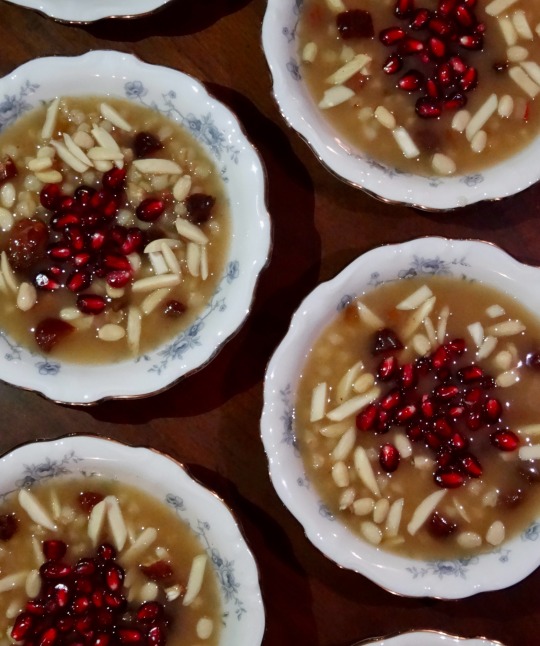
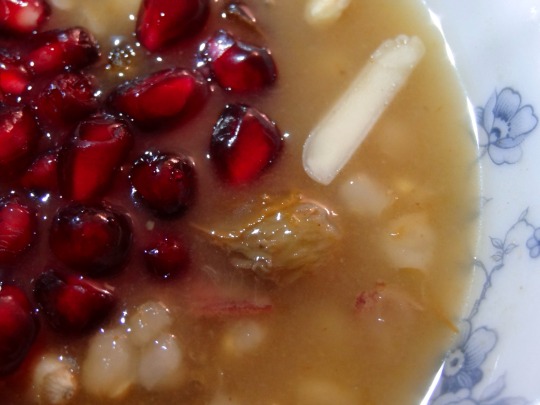
[ID: First image shows four small porcelain bowls of a pudding topped with slivered almonds and pomegranates seeds, seen from above. Second image is an extreme close-up showing the blue floral pattern on the china, slivered almonds, golden raisins, and pomegranate seeds on top of part of the pudding. End ID]
անուշապուր / Anush apur (Armenian wheat dessert)
Anush apur is a sweet boiled wheat pudding, enriched with nuts and dried fruits, that is eaten by Armenians to celebrate special occasions. One legend associates the dish with Noah's Ark: standing on Mt. Ararat (Արարատ լեռը) and seeing the rainbow of God's covenant with humanity, Noah wished to celebrate, and called for a stew to be prepared; because the Ark's stores were diminishing, the stew had to be made with small amounts of many different ingredients.
The consumption of boiled grains is of ancient origin throughout the Levant and elsewhere in West Asia, and so variations of this dish are widespread. The Armenian term is from "անուշ" ("anush") "sweet" + "ապուր" ("apur") "soup," but closely related dishes (or, arguably, versions of the same dish) have many different, overlapping names.
In Arabic, an enriched wheat pudding may be known as "سْنَينِيّة" ("snaynīyya"), presumably from "سِنّ" "sinn" "tooth" and related to the tradition of serving it on the occasion of an infant's teething; "قَمْح مَسْلُوق" ("qamḥ masluq"), "boiled wheat"; or "سَلِيقَة" ("salīqa") or "سَلِيقَة القَمْح" ("salīqa al-qamḥ"), "stew" or "wheat stew," from "سَلَقَ" "salaqa" "to boil." Though these dishes are often related to celebrations and happy occasions, in some places they retain an ancient association with death and funerary rites: qamh masluq is often served at funerals in the Christian town of بَيْت جَالَا ("bayt jālā," Beit Jala, near Bethlehem).
A Lebanese iteration, often made with milk rather than water, is known as "قَمْحِيَّة" ("qamḥīyya," from "qamḥ" "wheat" + "ـِيَّة" "iyya," noun suffix).
A similar dish is known as "بُرْبَارَة" ("burbāra") by Palestinian and Jordanian Christians when eaten to celebrate the feast of Saint Barbara, which falls on the 4th of December (compare Greek "βαρβάρα" "varvára"). It may be garnished with sugar-coated chickpeas and small, brightly colored fennel candies in addition to the expected dried fruits and nuts.
In Turkish it is "aşure," from the Arabic "عَاشُوْرَاء" ("'āshūrā"), itself from "عَاشِر" ("'āshir") "tenth"—because it is often served on the tenth day of the month of ٱلْمُحَرَّم ("muḥarram"), to commemorate Gabriel's teaching Adam and Eve how to farm wheat; Noah's disembarkment from the Ark; Moses' parting of the Red Sea; and the killing of the prophet الْحُسَيْن بْنِ عَلِي (Husayn ibn 'Ali), all of which took place on this day in the Islamic calendar. Here it also includes various types of beans and chickpeas. There is also "diş buğdayı," "tooth wheat" (compare "snayniyya").
These dishes, as well as slight variations in add-ins, have varying consistencies. At one extreme, koliva (Greek: "κόλλυβα"; Serbian: "Кољиво"; Bulgarian: "Кутя"; Romanian: "colivă"; Georgian: "კოლიო") is made from wheat that has been boiled and then strained to remove the boiling water; at the other, Armenian anush apur is usually made thin, and cools to a jelly-like consistency.
Anush apur is eaten to celebrate occasions including New Year's Eve, Easter, and Christmas. In Palestine, Christmas is celebrated by members of the Armenian Apostolic church from the evening of December 24th to the day of December 25th by the old Julian calendar (January 6th–7th, according to the new Gregorian calendar); Armenian Catholics celebrate on December 24th and 25th by the Gregorian calendar. Families will make large batches of anush apur and exchange bowls with their neighbors and friends.
The history of Armenians in Palestine is deeply interwoven with the history of Palestinian Christianity. Armenian Christian pilgrimages to holy sites in Palestine date back to the 4th century A.D., and permanent Armenian monastic communities have existed in Jerusalem since the 6th century. This enduring presence, bolstered by subsequent waves of immigration which have increased and changed the character of the Armenian population in Palestine in the intervening centuries, has produced a rich history of mutual influence between Armenian and Palestinian food cultures.
In the centuries following the establishment of the monasteries, communities of Armenian laypeople arose and grew, centered around Jerusalem's Վանք Հայոց Սրբոց Յակոբեանց ("vank hayots surbots yakobeants"; Monastery of St. James) (Arabic: دَيْر مَار يَعْقُوب "dayr mār ya'qūb"). Some of these laypeople were descended from the earlier pilgrims. By the end of the 11th century, what is now called the Armenian Quarter—an area covering about a sixth of the Old City of Jerusalem, to the southwest—had largely attained its present boundaries.
Throughout the 16th and 17th centuries, the Patriarchate in Jerusalem came to have direct administrative authority over Armenian Christians across Palestine, Lebanon, Egypt, and Cyprus, and was an important figure in Christian leadership and management of holy sites in Jerusalem (alongside the Greek Orthodox and Roman Catholic churches). By the middle of the 19th century, a small population of Armenian Catholics had joined the larger Armenian Apostolic community as permanent residents in Jerusalem, living throughout the Muslim Quarter (but mostly in a concentrated enclave in the southwest); in the beginning of the 20th century, there were between 2,000 and 3,000 Armenians of both churches in Palestine, a plurality of whom (1,200) lived in Jerusalem.
The Turkish genocide of Armenians beginning in 1915 caused significant increases in the populations of Armenian enclaves in Palestine. The Armenian population in Jerusalem grew from 1,500 to 5,000 between the years of 1918 and 1922; over the next 3 years, the total number of Armenians in Palestine (according to Patriarchate data) would grow to 15,000. More than 800 children were taken into Armenian orphanages in Jerusalem; students from the destroyed Չարխափան Սուրբ Աստվածածին վանք (Charkhapan Surb Astvatsatsin Monastery) and theological seminary in Armash, Armenia were brought to the Jerusalem Seminary. The population of Armenian Catholics in the Muslim Quarter also increased during the first half of the 20th century as immigrants from Cilicia and elsewhere arrived.
The immediate importance of feeding and housing the refugees despite a new lack of donations from Armenian pilgrims, who had stopped coming during WW1—as well as the fact that the established Armenian-Palestinians were now outnumbered by recent immigrants who largely did not share their reformist views—disrupted efforts on the part of lay communities and some priests to give Armenian laypeople a say in church governance.
The British Mandate, under which Britain assumed political and military control of Palestine from 1923–1948, would further decrease the Armenian lay community's voice in Jerusalem (removing, for example, their say in elections of new church Patriarchs). The British knew that the indigenous population would be easier to control if they were politically and socially divided into their separate religious groups and subjected to the authority of their various religious hierarchies, rather than having direct political representation in government; they also took advantage of the fact that the ecclesiastical orders of several Palestinian Christian sects (including the Armenian Patriarchate of Jerusalem) comprised people from outside of Palestine, who identified with religious hierarchy and the British authorities more than they identified with the Palestinian lay communities.
British policy, as well as alienating Armenians from politics affecting their communities, isolated them from Arab Palestinians. Though the previously extant Armenian community (called "քաղաքացի" "kaghakatsi," "city-dwellers") were thoroughly integrated with the Arab Palestinians in the 1920s, speaking Arabic and Arabic-accented Armenian and eating Palestinian foods, the newer arrivals (called "زُوَّار" / "զուվվար" "zuwwar," "visitors") were unfamiliar with Palestinian cuisine and customs, and spoke only Armenian and/or Turkish. Thus British policies, which differentiated people based on status as "Arab" (Muslim and Christian) versus "Jewish," left new Armenian immigrants, who did not identify as Arab, disconnected from the issues that concerned most Palestinians. They were predominantly interested in preserving Armenian culture, and more concerned with the politics of the Armenian diaspora than with local ones.
Despite these challenges, the Armenian Patriarchate of Jerusalem came to be a vital center of religious and secular culture for the Armenian diaspora during the British Mandate years. In 1929, Patriarch Yeghishe Turian reëstablished the Սուրբ Յակոբեանց Տպարան ("surbots yakobeants taparan"; St. James printing house); the Patriarchate housed important archives relating to the history of the Armenian people; pilgrimages of Armenians from Syria, Lebanon, and Egypt increased and the economy improved, attracting Armenian immigrants in higher numbers; Armenians held secular roles in governance, policing, and business, and founded social, religious, and educational organizations and institutions; Armenians in the Old and New Cities of Jerusalem were able to send financial aid to Armenian victims of a 1933 earthquake in Beirut, and to Armenians expelled in 1939 when Turkey annexed Alexandretta.
The situation would decline rapidly after the 1947 UN partition resolution gave Zionists tacit permission to expel Palestinians from broad swathes of Palestine. Jerusalem, intended by the plan to be a "corpus separatum" under international administration, was in fact subjected to a months-long war that ended with its being divided into western (Israeli) and eastern (Palestinian) sections. The Armenian population of Palestine began to decline; already, 1947 saw 1,500 Armenians resettled in Soviet Armenia. The Armenian populations in Yafa and Haifa would fall yet more significantly.
Still, the Armenian Patriarchate of Jerusalem maintained its role as the center of Armenian life in Palestine; the compound provided food and shelter to thousands of Armenians during the Battle for Jerusalem and the Nakba (which began in 1948). Some Armenians formed a militia to defend the Armenian Quarter against Haganah shelling during the battle.
In the following years, historical British contributions to the shoring up of insular power in the Patriarchate would cause new problems. The Armenian secular community, no longer empowered to oversee the internal workings of the Patriarchate, could do nothing to prevent embezzling, corruption, and even the sale of church-owned land and buildings to settlers.
In 1967, Israeli military forces annexed East Jerusalem, causing another, albeit smaller, surge in Armenian emigration from the city. Daphne Tsimhoni estimates based on various censuses that the Armenian population of Jerusalem, which had reached 5,000-7,000 at its peak in 1945–6, had fallen back to 1,200 by 1978.
Today, as in the 20th century, Armenians in Jerusalem (who made up nearly 90% of the Armenian population of Palestine as of 1972) are known for the insularity of their community, and for their skill at various crafts. Armenian food culture has been kept alive and well-defined by successive waves of immigrants. As of 2017, the Armenian Patriarchate supplied about 120 people a day with Armenian dishes, including Ղափամա / غاباما "ghapama" (pumpkin stuffed with rice and dried fruits), թոփիկ / توبيك "topig" (chickpea-and-potato dough stuffed with an onion, nut, fruit, and herb filling, often eaten during Lent), and Իչ / ايتش "eetch" (bulgur salad with tomatoes and herbs).
Restaurants lining the streets of the Armenian and Christian quarters serve a mixture of Armenian and Palestinian food. Լահմաջո "lahmadjoun" (meat-topped flatbread), and հարիսա / هريس "harisa" (stew with wheat and lamb) are served alongside ֆալաֆել / فلافل ("falafel") and մուսախան / مسخن ("musakhkhan"). One such restaurant, Taboon Wine Bar, was the site of a settler attack on Armenian diners in January 2023.
Up until 2023, despite fluctuations in population, the Armenian community in Jerusalem had been relatively stable when compared to other Armenian communities and to other quarters of the Old City; the Armenian Quarter had not been subjected to the development projects to which other quarters had been subjected. However, a deal which the Armenian Patriarchate had secretly and unilaterally made with Israel real estate developer Danny Rotham in 2021 to lease land and buildings (including family homes) in the Quarter led Jordan and Palestine to suspend their recognition of the Patriarch in May of 2023.
On 26th October, the Patriarchate announced that it was cancelling the leasing deal. Later the same day, Israeli bulldozers tore up pavement and part of a wall in حديقة البقر ("ḥadīqa al-baqar"; Cows' Garden; Armenian: "Կովերի այգու"), the planned site of a new luxury hotel. On 5th November, Rothman and other representatives of Xana Gardens arrived with 15 settlers—some of them with guns and attack dogs—and told local Armenians to leave. About 200 Armenian Palestinians arrived and forced the settlers to stand down.
On 12th and 13th November, the developer again arrived with bulldozers and attempted to continue demolition. In response, Armenian Palestinians have executed constant sit-ins, faced off against bulldozers, and set up barricades to prevent further destruction. The Israeli occupation police backed settlers on another incursion on 15th November, ordering Armenian residents to vacate the land and arresting three.
On December 28th, a group of Armenian bishops, priests, deacons, and seminary students (including Bishop Koryoun Baghdasaryan, the director of the Patriarchate's real estate department) were attacked by a group of more than 30 people armed with sticks and tear gas. The Patriarchate attributed this attack to Israeli real estate interests trying to intimidate the Patriarchate into abandoning their attempt to reverse the lease through the court system. Meanwhile, anti-Armenian hate crimes (including spitting on priests) had noticeably increased for the year of 2023.
These events in Palestine come immediately after the ethnic cleansing of Լեռնային Ղարաբաղ ("Lernayin Gharabagh"; Nagorno-Karabakh); Israel supplied exploding drones, long-range missiles, and rocket launchers to help Azerbaijan force nearly 120,000 Armenians out of the historically Armenian territory in September of 2023 (Azerbaijan receives about 70% of its weapons from Israel, and supplies about 40% of Israel's oil).
Support Palestinian resistance by donating to Palestine Action’s bail fund; buying an e-sim for distribution in Gaza; or donating to help a family leave Gaza.
Ingredients
180g (1 cup) pearled wheat (قمح مقشور / խոշոր ձաւար), soaked overnight
3 cups water
180-360g (a scant cup - 1 3/4 cup) sugar, or to taste
Honey or agave nectar (optional)
1 cup total diced dried apricots, prunes, golden raisins, dried figs
1 cup total chopped walnuts, almonds, pistachios
1 tsp rosewater (optional)
Ceylon cinnamon (դարչին) or cassia cinnamon (կասիա)
Aniseed (անիսոն) (optional)
Large pinch of salt
Pomegranate seeds, to top (optional)
A Palestinian version of this dish may add pine nuts and ground fennel.
Pearled wheat is whole wheat berry that has gone through a "pearling" process to remove the bran. It can be found sold as "pearled wheat" or "haleem wheat" in a halal grocery store, or a store specializing in South Asian produce.
Amounts of sugar called for in Armenian recipes range from none (honey is stirred into the dish after cooking) to twice the amount of wheat by weight. If you want to add less sugar than is called for here, cook down to a thicker consistency than called for (as the sugar will not be able to thicken the pudding as much).
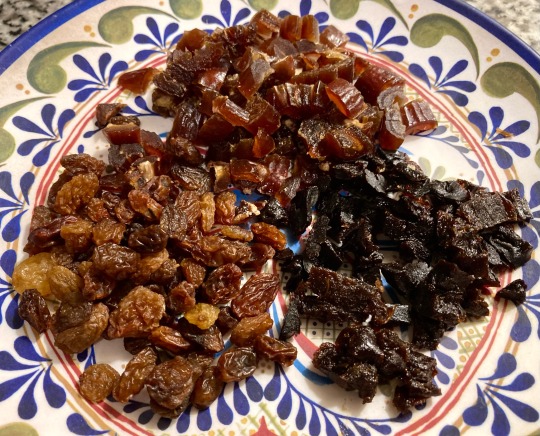
Instructions
1. Submerge wheat in water and scrub between your hands to clean and remove excess starch. Drain and cover by a couple inches with hot water. Cover and leave overnight.
2. Drain wheat and add to a large pot. Add water to cover and simmer for about 30 minutes until softened, stirring and adding more hot water as necessary.
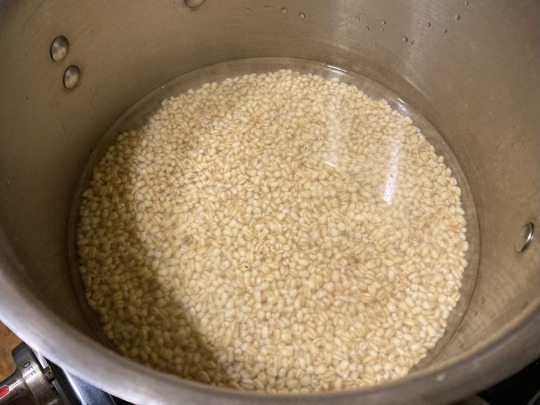
Wheat before cooking
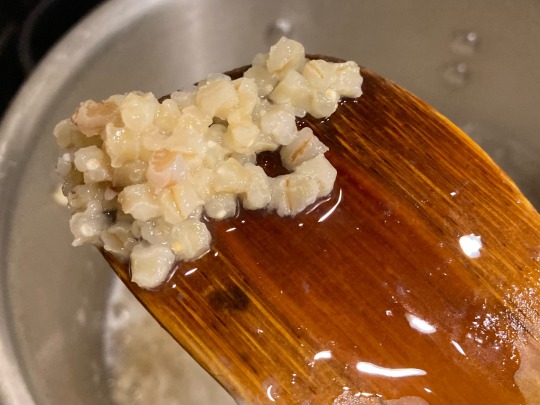
Wheat after cooking
3. Add dried fruit, sugar, salt, and spices and simmer for another 30 minutes, stirring occasionally, until wheat is very tender. Add water as necessary; the pudding should be relatively thin, but still able to coat the back of a spoon.
4. Remove from heat and stir in rosewater and honey. Ladle pudding into individual serving bowls and let cool in the refrigerator. Serve cold decorated with nuts and pomegranate seeds.
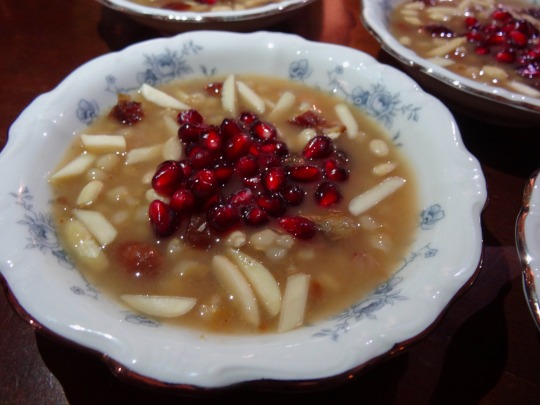
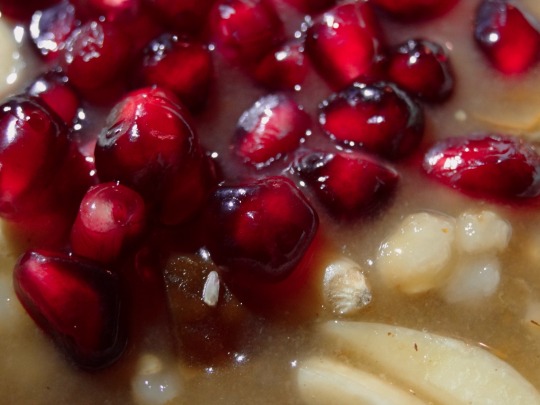
#the last link is a different / new fundraiser#Armenian#Palestinian#fusion#wheat berries#pearled wheats#pomegranate#prunes#dried apricot#dates#long post /
380 notes
·
View notes
Note
can you tell me more about henry x gansey. I feel like I'm so close to seeing the light


this is who you are. to me. for asking. i love (sar)chengsey SO SO BAD. i have made several posts about them across the years including at minimum 5 fics (eg 1, 2) but its like. i ADMIT my favorite version of them requires editing of canon(in that they dated and broke up before TRB) but even if you DONT do that and stick exclusively to whats written:
required reading IMO is specifcally TRK chapters 28, 29, 30, 37, 38, 58, 66. i knowwww we all forget wtf happened in trk but i feel theyre so good for establishing henry as a well rounded character in a subtle and natural way
i will begin this essay by pointing out that henry jokes and wears a 'snazzy' outfit one time which is all fanon cares about BUT he canonically knows way more about the fairy market and declan's history and niall lynch than ANY of the gangsey do. also he got KIDNAPPED and kept in a GRAVE for FIVE ENTIRE DAYS. and has had weapons pointed at him MORE THAN ONCE! (ch37).

^the logo bear is a henry thesis statement. to me. now to the meat of it. gansey and henry are character foils in almost exactly the same way ronan and kavinsky are. (new guy with an established friend group who you see on the fringes abruptly becomes a main character who has one-on-one interactions with a member of the gangsey going through a crisis of self.) henry acknowledges this by pointing out their shared age 10 traumas + their shared tendencies to put themselves into the exact situations they're afraid of (gansey with the outdoors, henry with holes). gansey specifically says that henry is practically his twin,

and smth i find crucial abt chengsey is that henry is the only person who has never needed anything from gansey. gansey who has spent the entirety of his appearance since page one making plans for his own demise, desperately stressed about how people will function without him, what happens to ronan, what happens to noah, what adam's father could do to him, etc. henry is the manic pixie dream girl urging gansey to actually LIVE and not just wait to die.

henry is the only one of the gangsey who fundamentally understands that every side of gansey is gansey. blue likes who he is but hates president cell phone. henry not only sees president cell phone, he breaks through PCP when gansey is IN that mode. it's why gansey's parents like him better than ronan and adam. they'll GET each other in a way that adam or blue or ronan can't share because theyre inherently different in personality & the way theyve been raised. the reason noah goes away when henry enters the situation is because henry/noah functionally fill the same Vibe slot :shrug: there's smth to be said about henry and gansey's individual reactions to having guns pointed at them but this is long enough as is.

one last thing is that henry has been in an enemies-to-friends thing with gansey the whole time. henry was specifically meant to spy on gansey for nefarious reasons but CHOSE to betray his mother and change his mind and choose gansey's friendship. i think it's largely because gansey passed a test of mettle by just. being a good person. and this friendship with henry SAVES HIS LIFE because when everyone else is freaking out, henry says the one thing nobody else realises, the one thing that actually kickstarts gansey's resurrection:

WAIT SORRY ONE LAST EDIT. when i read this at 16 i was like "....hot. will make this my personality now."


#sorry its 12am and this is as fast and concise as i could be#i love them.#chengsey#trc#trc meta#long post#ans#forests-green#i dislike the trk epilogue and dreamer trilogy sarchengsey/henry a lot for many reasons. but this is why im Like That#henry cheng#the raven king#the raven cycle
40 notes
·
View notes
Note
this is so off topic but omg i wanted to say something about what you said about Gansey and Adam being balanced because: ok there's this scene in The Raven Boys where, right after Gansey offends Blue at Nino's, they're standing outside after Ronan and Declan have fought, and they're bouncing ideas off each other. And it's such an odd thing to focus on, I know, but Adam is like... bouncing a ball and giving Gansey ideas, strategies, and Gansey is meeting him pace for pace. And Adam says something, drops the ball, and Gansey picks it up and agrees with his idea. I'm on the bus and can't pull my copy out but it was such a *big moment* to me. And it solidifies that, at that point in the story, Gansey views Adam as an intellectual equal? I think it's a larger piece of how Adam views himself as inferior and how that *is* prime unreliable narrator material because Gansey sees Adam as his idea man, his science guy, his left hand. That part of their dynamic is so fascinating because it further bleeds into the dissonance of how they see their roles in one another's life.
Anyway, in conclusion Adam is the Piper Greenmantle to Gansey's Colin Greenmantle send tweet.
Ah yes… The SpongeBob rubber ball (that cracked me up). That scene was interesting to read, then reread now that I know more about Gansey and Adam. Essentially, Adam is discussing to Gansey about keeping the quest for Glendower a secret, and Gansey states that it’s already too late to keep it secret. Adam combats this with “But now we are being observed” and he was not wrong that they were. At the time, Mr. Noah Killer Fuck face (Whelk) was indeed observing all of them, especially Gansey. Gansey sort of brushes it off, but Adam is insistent enough that Gansey even thinks about the fact that someone is observing them, though he frames it as “Do you think there would be any point to someone spying us if we weren’t on the right track?”
Strangely enough, I view Adam and Gansey as polar opposites, and this conversation solidifies it. Gansey takes what Adam is saying and spins it in a positive/optimistic light because he needs to be the optimist in this (We can also discuss how he is naive in the first two books and that’s why he is so optimistic)… While Adam takes being observed as a bad thing. They are both giving each other what the other doesn’t have: Adam with his logical pessimism and Gansey with his ideal optimism. Gansey does view Adam as his intellectual equal, though Adam, at this point of the story, has such a negative view on himself (due to the abuse) that he doesn’t exactly see that. If that scene was in Adam’s POV, it would have been framed completely different. We would not have that sense that Gansey views him as an intellectual equal, as the idea man or the man with valid arguments. Adam would probably view Gansey as being too optimistic or idealistic of the situation.
All in all, Gansey is the one who views Adam as an equal while Adam struggles with that. It’s not until later that Adam begins to believe he is on the same par as Gansey… and unfortunately that is when their roles began to flip slightly. Gansey, starting in the third book, begins to shed his naïveté (thank you autocorrect LMAO) and seeing everything in a more realistic (not necessarily pessimistic) view. Adam begins to also see things differently, and honestly, they both begin to converge in many ways…
#I yapped lmao#But I do be analyzing them all the time#Because they are the yin yang of the book#the raven cycle#trc#richard gansey#adam parrish
37 notes
·
View notes
Note
ADAM AND NOAH USED TO BE THE SAME PERSON... RIGHT.... THEY MAKE ME THINK... like i think i read that textually they used to be the same Character as written by mstief. but also the similarities. quiet, observers, on the outside. brought out of their shell by friends (ronan most notably, in common for both of them- they are both so special to him). violently betrayed by those they're close to, who should have cared for them. forever changed, marked as 'different' from the others (noah "i was more when I was alive", adam becoming more connected to the ley line post cabeswater deal). i wish we'd had more of them in trc... anyway pls if you'd like share thoughts/snips of ur adam & noah ideas i'm so curious!!
OKAY NO SO I THINK ABOUT THIS ALL THE TIME! Because at what point did Adam and Noah become separate? I know it was an early draft, of course, but the parallels?? (Also, Blue explicitly taking time to tell the reader why Adam and Noah differ, I find so interesting?)
I don't have an essay in me tonight, but if I may just bullet point things that keep me up at night over the Adam-and-Noah of it all?
They're both observers, like you said. On the outside looking in. Not quite part of the group, in their eyes. Attached to Cabeswater through a deal (much like Gansey, but Adam and Noah are explicitly tied to these sacrifices.)
Adam + Whelk parallels. What did this originally look like?
The story doesn't work without the Noah subplot, so that means, I assume, Adam's role was not present in this draft?
How close Ronan and Noah are, and how close Adam and Ronan become? There's so many scenes of these three together, chatting and bickering. No wonder I read romantic undertones between Ronan and Noah. (Or I'm a fiend idk)
Adam being actively comforted by Noah being smudgy or faded or rumpled. Feels a sort of comraderie in this regard.
Noah fears for Adam's safety, is present in the background for Adam more than he explicitly talks to him?
Noah + Gansey and then Gansey + Adam?????
The Blue/Noah kiss AND the Blue/Adam side plot.
I could go on. Like on and on and on.
I'll stop now because this will become a problem.
Okay last one: after their associated deals with Cabeswater, each of them is irrevocably changed. And this happens directly after each is severely and horrifically traumatized, like you said, by someone who should have cared about them. How Adam's sacrifice marks the beginning of the awakening of Cabeswater and Noah's sacrifice marks the end. How if you shift the plot half a degree to the left it would be about Noah and Adam.
You mentioned them being different! Yes! Noah is a ghost, something offputting, something other in the eyes of most. Adam is described as ethereal, otherworldly, a creepily clever fuck. They're both explicitly more than human in a way the others aren't?
They both fade into the background until they don't, then they command the room and become the center of the room's gravity.
They're both explorations on loss of self and autonomy, imo.
When I write Noah and Adam it's with the approach of "these are two introverts who are used to observing, not being observed." So I love putting them in circumstances where they sit with one another and just... chat? That sounds boring, I worry. But I think Noah is gentle with Adam, in a way Adam is alright with (as he's explicitly very fond of Noah, considers getting along with Noah a marker of a person's character), and prods just enough so to get Adam to open up and be a little more vulnerable with. I see Noah as someone able to pry truths out of others? He's a confidant of the group, and I see that dynamic working beautifully with Adam. I think it's a matter of what happens when you put two introverts in a room together when they're used to observing and now they are being observed.
It's hard to pinpoint how Adam influences Noah in canon, as mainly Noah picks pieces of Adam apart, gets in his head, provides him with assurance and vulnerability. But my personal way of writing this is that Adam provides a place for Noah to just... ramble on? I worry I'm not explaining this well. Let me just show off a portion from an Adam-centric fic I'm writing (unedited and I'm fiddling with it don't mind it I'm begging you I wrote this at like 2am a few days ago)
“Oh, scarf.” Noah pointed out, “Adele tried knitting this. She's not very good. Ask her if she's gotten better, will you?” “I haven't talked to your sister.” Adam pointed out, “Might want to ask Blue.” Noah shook his head, wove open scales of purple between his fingertips, catching the odd silver thread under fluorescent. “Think the whole ‘my family is a psychic’ thing threw them off. She's not the biggest fanatic of that idea. Magic. Ghosts.” Neither was Adam, but Gansey had pulled him along with magnetism and raw charm. A little coercion, or a borrowed purpose, did wonders. “She'd like you.” Noah continued, “At least, I think she would. She might have changed. Age does that, I think.” “That's the rumour.” Adam said, with little else to contribute. He rolled his neck along the jut of Noah's mattress, still half propped against the frame, half spread over the floor. Knobby knees and limbs took up some hefty real estate, though neither of them paid that any mind. Noah frowned at the scarf, and draped it over his knee. “Do you think you'll change?” Adam stiffened, though Noah was so fixated on the curve of his own knee it evaded notice. He was not someone inclined to prayer, not devout or religious in any sense of the word. Where Ronan found some twisted self flagellating delight kneeling in pews under cascading mosaic light, and Gansey made altars in the press of leather and newspaper clippings, Adam sunk his hands in the dirt, gripped the roots of reality and knew the only god to be found was the one within the brush of fingertips. Tangible. Touchable. Corruptible. So, it made no sense Adam prayed - at least, the closest he'd get to prayer - for change. To grow. That the response to Noah's question was a simple, aimless plea of please, let me change, evolve. To remain stagnant was to admit defeat, to succumb to human nature and dwell in the dangers of comfort and self destruction. Nevermind that he knew there was, likely, not a god of any denomination to carry him to the finish line. He'd do that all alone, with his blood and his nerve and the scrapes along his knees reminding him he'd ached for this.
just a way that I think Noah is able to pry thoughts from Adam he doesn't typically give himself permission to think? And Noah, much like how he opens up to Blue, is able to open up to someone as equally inclined to being a listener. If that makes sense.
My other Noah and Adam spiel is solely because of my Noah Swimmer AU! that I've posted a bit about? Where Noah was injured by his high school (homoerotic lbr) best friend and was unable to swim for his college. So he goes to college anyway (omg rich parents) and he's assigned as Ronan's roommate his second year, and one thing leads to another and he lies to Ronan about being on the swim team and offers to coach Ronan's younger brother, Matthew, a college freshman. I'm toying with a background Adam arc and Noah's actually a huge part of that! Because the idea of the fic is exploring the dynamics from Noah's perspective, seeing how he aids them on their own journeys, and how he is equally aided from theirs? Sort of a symbiotic healing process?
Anyway, Noah and Adam strike up this very quiet friendship (according to my outline) and Noah is someone Adam is able to be vulnerable with in a manner he's unaccustomed to? I have a whole scene where Adam, who's recognized a lot of signs of prior abuse and trauma in Noah, kind of takes a moment to relate to Noah, who has a chronic pain as a result of his injury, and opens up about his family history. Which is meant to be huge because Adam hasn't told anyone before. People know, but it's important in my head that Noah is the first person Adam says it out loud to:
Whatever he decided, whatever place on his list of potentials and possibilities this solution held, it satisfied the fidget of thumbnail against enamel. He dropped a palm in his lap and fixed Noah with a resolute set to his jaw. "My father used to hit me." He said, rolled the words like they were a foreign tongue, unfamiliar. It sounded like a secret, the kind one would acknowledge pragmatically but refuse to bring under light. "I'm deaf. In my left ear. Because of him." Noah blinked. Shifted to lean down at Adam, dangled a hand off his bed in offering, "Can I...?" Adam cocked his head. He looked at Noah's fingers like one might approach a loaded gun. "I'm just curious." Noah affirmed. "You can touch mine." He gestured to his knee, his shoulder. "No, it's...." Adam frowned. Or his features were at rest. Neutrality and misery sat identical over mouth and brow and nose. "Sure." Noah shuffled forward, just an inch, and drifted his hand to tickle over the shell of Adam's ear, tinged pink in the shrapnel of afternoon that filtered through window blinds. "It feels the same." Noah said, let a thumb brush to antihelix, to tragus, to canal. "Nothing?" "No." Adam said, eyes vacant. There was little to bring Adam back to his body, in Noah's experience. Escapism was its own balm. "Does it..." He scratched his nail over cartilage, "Do you just not... feel anything?" "It's..." Adam scrunched his nose, still focused on Noah's college-ruled composition book, etching galaxies in the random speckles of black and white. "Lemme..." He cupped Noah's knuckles, palm to jutting bone. Adam's fingers were longer, calluses gritty and harsh where they rubbed on Noah's more malleable skin. He curled Noah's index until it scratched against the shell. "I can't hear it." "My finger?" Adam held his other hand up, a silent request. Noah tilted his head, nose brushing rumpled comforter, offering his ear up. A finger, feather light, tentative, ran a nail's edge across the perimeter. Noah focused on the scrape of it, a sound he'd so often taken for granted it hadn’t registered as something to note. Percieveing it now was... not quite unsettling, but grounded a piece of himself he typically kept adrift. That most people kept adrift. How odd, Noah thought, to lose a piece of yourself you hadn't acknowledged before. "I can't really hear that. I know it's not exactly a noise. I mean it is, its a noise. I just don't..." Adam's breathe feathered Noah's bangs into a frenzy. His stare was intent on his hand. "I don't register it. On my left side." "Oh." "Yeah." Adam slumped back, dropped his hand with a startling smack. Noah wanted to ask why Adam would share this with him, of all people. Why he'd waited for Ronan and Gansey to leave. Maybe there was safety in Noah's status as outsider. Observer. He knew Noah couldn't apply context to something he didn't understand. And he still didn't quite understand Adam. Any of them, really. "When I..." Adam took a careful three draws in between his teeth, out in a smooth whistle. "When this," He pinched his lobe, "happened, I..." Swallowed. If Noah squinted he'd see phantom fingers clamped over the other's mouth, remnants of forced silence. "I thought he knocked something from me. Out of me. Permanently." Noah's skin chilled. He rubbed at his shoulder, the twinge when he rotated too far. "It took me a very," Adam finally, finally, made eye contact, "Very long time to realize I could control what was or wasn't up for taking." From the common room, the lock clicked. Ronan and Gansey back. He clenched his fists in his pant fabric. Adam was still staring, icy and determined as an hour ago when he'd hunched over numerical equations. There was only guesswork to see what value Noah had been designated. "No one broke you." Adam said, as Noah breathed in a way he hoped looked casual. "You're not the product of what someone else did to you. You're the product of what you do with it."
ofc i'm assuming at this point Adam will be in his sophomore year of college and have come to terms with his history? Hence the odd brand of emotional maturity. This fic isn't about Adam, so I won't dwell on Adam's development too hard. And he sees a bit of himself in Noah. so hence the characterization here. Because Noah is angry and genuinely depressed after losing this thing he used to define himself by, and he's caged and closed off, and Adam sees a piece of himself in it.
Anyway, sorry for rambling. One of my favourite types of fic to write are the kind that fuck with canon dynamics by switching things up a bit. And even if the fic is Noah/Matthew centric I've been writing drabbles of the Noah and Adam friendship and it lights me up inside. (I have a really fun subplot I've been messing with where Noah is watching a Kavinsky/Ronan/Adam clusterfuck unfold and going hey what the fuck is going on?)
Sorry this turned into a fic dump ahhh! I just adore picking at Noah/Adam as a duo. Maybe I should make them kiss someday idk.
#this is rough rough rough draft btw like... rough rough rough i worry about adam's voice here but tbh this fic isn't... super about him?#FRIEND I ADORE YOU BTW! SO MUCH! YOU ARE ALWAYS SO LOVELY TO INTERACT WITH!#sunflowersandscreams#c.ask#c.writing#noah czerny#adam parrish#the raven cycle
36 notes
·
View notes
Text
TRC reread post 5
TRB chapters 9-12
I've spent so much time having to stop mid-dog-walk to feverishly type out quotes I want to come back to. This is definitely the problem with only having the audiobooks and not the physical copies. I am longing to fill them with Gansey-level obsessive notes and pictures. Kudos and respect to @eepybois who colour codes the notes in their copies, that is so magical. Please tell me more about your colour coding system. I am that kind of neurodivergent :D
ANYWAY, more thoughts...
Mallory
Mallory is my hero. Him ranting about the NHS is both hilarious and so real. Most realistic portrayal of a British character.
His phone manner is horrifying and brilliant.
Gansey really is that kid who gets on better with adults, isn't he. He was born aged like 45.
We Need to Talk About Ronan
Fitting that it was Noah who found Ronan 'in a pool of his own blood'. Is Noah drawn to death? Is that why he lingers with Gansey too? It all ties together so well.
How jarring must it be for Ronan to have everyone think he was trying to kill himself. And like, was he? It was technically his self conscious mind. I wonder how he sees it consciously at this point in the narrative.
The last time Ronan was found in the church, his subconscious had tried to kill him. This time it gave him Chainsaw- a 'dependent', a reason to stay alive. He needs to be needed and wanted and loved, but he doesn't know how to handle it, so he's given himself a creature whose love and dependancy he can accept more readily. He might not know it consciously, but this is the first step to him letting himself love and be loved (and you know who I'm thinking of now, right??)
'How strange that a season should be held captive in one breath of trapped air.' This is Gansey's thought as he steps into the church to find Ronan. No comments, its just a beautiful line.
Ok maybe one comment- as much as the season referred to is Spring, on another level Gansey is remembering Ronan nearly dying and all the thoughts around that, so 'season' also acts as a collective noun for all that remembered trauma.
Ronan said he found Chainsaw in his head. It has the same brilliant vibe of Noah's 'I've been dead for seven years.' Everyone is speaking their truth here, its just that no one is really listening.
Of course he takes his baby bird to school with him. Gansey's tired-mom reaction to this is priceless. He worries so much about all his kids. His love for them is constantly present and clearly unconditional. Urgh I can't even.
Noah
The poor kid is so obviously dead. Like how did I not know this first time around? I LOVE that I didn't.
'Death isn't as close as you think.'
Gansey says this to himself in chapter 12 after calling Noah to see if he's heard from Adam. It's so hilariously ironic. Noah literally signs off the call with something like 'I'm already gone, anyway'.
Noah had a girlfriend who cheated on him with Whelk?!? How do we not talk about this more??
Every time I listen to a Whelk section I am full of rage, particularly for how he describes Noah. Like he judges Noah for following him, calling him a sheep, but he also wants his loyalty. While clearly giving nothing in return. Noah deserved so much more.
Persephone!!!
So pleased to meet her properly again in chapter 11.
She had a husband or boyfriend who was either dead or overseas?? I need to know more about this!!
Her little voice and her strange appearance meaning people may misjudge her is a wonderful reflection of Adam's character too. The difference being Persephone has embraced her nature and her power while Adam wholly rejects himself.
#harrie reads trc again#i have so many thoughts#fuck Whelk#Mallory appreciation society#persephone#trb#trb spoilers#trc#the raven cycle#the raven boys#richard gansey#ronan lynch
30 notes
·
View notes
Note
I've thought about how gentile Abrahamic religions are antisemitic religious colonialism before and it pisses me off a ton and I'm thankful you said it, but now that it's someone besides me saying it, I'm gonna give some criticism (please don't take this personally)
Everything up to Abraham (particularly Adam and Noah) have G-d creating and tending to the entirety of humanity, right?
During Abraham's time, it should stand for something that G-d tends to Hagar and Ishmael, right? Especially since Hagar gives her own name for G-d and He makes a promise to Ishmael that he'll be the father of nations (or something like that). And I think the Prophet Muhammad is supposed to be descended from Ishmael.
And Noahides are a whole Thing in all this too ofc.
But the bigger thing is there are definitely texts and interpretations that take G-d being the G-d of the Hebrews and extend it to Henotheism, but for the Jews who are purely monotheists and say there is truly only one G-d in existence and He belongs only to us, isn't it cruel to totally deny the vast majority of humanity the Divine, especially if He is still their Creator and controls the world(s) they live in?
this whole thing is coming from the assumption that judaism was always monotheistic. it wasn’t. at one point in time we were monolatrous, meaning we only worshipped one g-d but didn’t deny the existence of others. hell, the language used in the torah supports this (the way the text treats egypt’s g-ds being perhaps the most prominent example). hashem has always been our specific g-d, since before the idea emerged that he is the only g-d. our/the world’s perception of him may have since evolved into this idea of one singular deity, but it has not always been that way.
hagar and ishmael still come from our mythology surrounding our particular g-d. the idea then emerged in islam, which was born with the same jewish roots that christianity was, that muslims were descended from ishmael. and, like, i don’t really mind or care about that either way. ishmael’s not a super major figure in our folklore. the story, along others in breishit, genuinely does lend itself to the idea that hashem can be the guardian of many different peoples, families, and nations. and to tell the truth i don’t genuinely have much of a problem with sharing some folklore and roots.
but it NEEDS to be acknowledged where those roots come from. for so much of history, right up until today, christians and muslims have pretended they know our g-d and our folklore and our history better than we do. they have MURDERED us for worshipping our g-d and practicing our customs in OUR way, the way we have been since before their religions and cultures emerged. if the religions that find their roots in our culture were more willing to listen to us, respect us, and learn from us, maybe i’d be less angry. but they’re not. they’ve tried and tried and tried to eradicate us and erase where they came from and make our stuff theirs. i don’t think it has to be like that forever but i don’t think we’re very close to it not being like that as of now.
also, i can’t think of a single cultural mythology that doesn’t have a creation story of some kind. it’s just the kind of thing that societies do when they try to make sense of their place in the grand scheme. the fact that we believe our g-d created the entire world does not actually mean that that story or that g-d belongs to the entire world. the fact that everybody thinks our creation myth applies to and belongs to them is just more evidence of how widely our culture has been co-opted.
there’s nothing we can do to change the fact that our g-d has been made universal (either through the natural evolution of our theology or from colonialism and cultural theft, more likely a combination of both) and i have to be fine with that. sure, fine, the people who have adopted our g-d as their own without actually bothering to understand us at all can outnumber us by orders of magnitude.
but why does our holy city have to also be their holy city? the christians have the vatican and rome and islam has mecca and medina. why do they need jerusalem? why can’t even that just be ours?
again, i have to push this aside and be okay with sharing if i truly want to have peace in our land. and i do, because i love eretz yisrael and yerushalayim more than i hate what has been done to her. the situation has grown so far beyond the injustices i am angry about that it is impossible to right those injustices without creating brand new ones. so i will be okay with sharing our g-d, our texts, and our land. but that doesn’t mean the injustice of it won’t burn like a fire in my heart.
#txt#ask#anonymous#jumblr#< yeah fuck it i’ll tag this one. im saying a lot of things and i wanna see if they make sense to people
86 notes
·
View notes
Text
Paradise Lost: How John Milton's 1667 work influenced "Hazbin Hotel"
I've been thinking about why the "fruit of knowledge" in Hazbin Hotel is depicted as an apple, as opposed to another fruit that would've been more accurate to the Middle East during the Fall of Man, as well as how Paradise Lost by John Milton (1667) influenced the show.
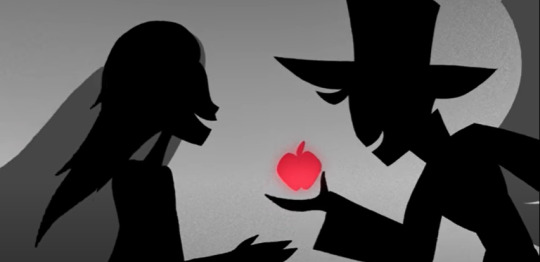
Per one source:
"Because the Hebrew Bible describes the forbidden fruit only as 'peri', the term for general fruit, no one knows [what exactly type of fruit it was]. It could be a fruit that doesn't exist anymore. Historians have speculated it may have been any one of these fruits: pomegranate, mango, fig, grapes, etrog or citron, carob, pear, quince, or mushroom."
Per Wikipedia:
"The pseudepigraphic Book of Enoch describes the tree of knowledge: 'It was like a species of the Tamarind tree, bearing fruit which resembled grapes extremely fine; and its fragrance extended to a considerable distance. I exclaimed, How beautiful is this tree, and how delightful is its appearance!' (1 Enoch 31:4)."
In Jewish and Islamic traditions, the "fruit of knowledge" is commonly identified with grapes. The Zohar explains that Noah attempted (but failed) to rectify the sin of Adam by using grape wine for holy purposes. Today, the "Noah grape" is still used to make white wine.

Furthermore:
"The association of the pomegranate with knowledge of the underworld as provided in the Ancient Greek legend of Hades and Persephone may also have given rise to an association with knowledge of the 'otherworld', tying-in with knowledge that is forbidden to mortals. It is also believed Hades offered Persephone a pomegranate to force her to stay with him in the underworld for 6 months of the year. Hades is the Greek god of the underworld, and the Bible states that whoever eats the forbidden fruit shall die."
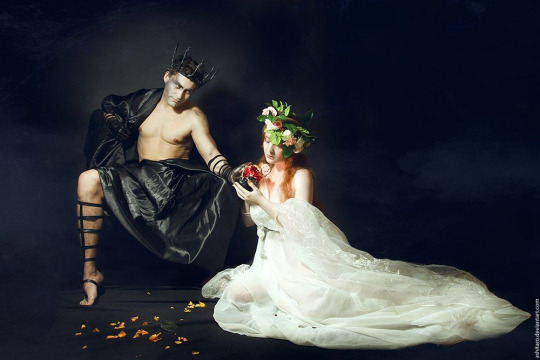
So, how then did the apple become the foremost symbol of the "fruit of knowledge"? You can partly thank Paradise Lost by English poet John Milton, a work which the lore of Hazbin Hotel is based off of.
Milton published the book in 1667, a time when the hedonistic Restoration era was in full swing. The exiled King Charles II was restored to the throne as King of England in 1660, and was a party animal, with dozens of mistresses, and nicknamed both the "playboy prince" and "Old Rowley", the latter after his favorite lustful stallion.
However, the association of the "fruit of knowledge" began with a Latin pun long before Milton immortalized the association in Paradise Lost. Per the linked article above by Nina Martyris for NPR:
"In order to explain, we have to go all the way back to the fourth century A.D., when Pope Damasus ordered his leading scholar of scripture, Jerome, to translate the Hebrew Bible into Latin. Jerome's path-breaking, 15-year project, which resulted in the canonical 'Vulgate', used the Latin spoken by the common man. As it turned out, the Latin words for evil and apple are the same: 'malus'.
[...] When Jerome was translating the 'Tree of the Knowledge of Good and Evil', the word 'malus' snaked in. A brilliant but controversial theologian, Jerome was known for his hot temper, but he obviously also had a rather cool sense of humor.
'Jerome had several options,' says Robert Appelbaum, a professor of English literature at Sweden's Uppsala University. 'But he hit upon the idea of translating 'peri' as 'malus', which in Latin has two very different meanings. As an adjective, 'malus' means 'bad' or 'evil'. As a noun it seems to mean an apple, in our own sense of the word, coming from the very common tree now known officially as the 'Malus pumila'. So Jerome came up with a very good pun.'
The story doesn't end there. 'To complicate things even more,' says Appelbaum, 'the word 'malus' in Jerome's time, and for a long time after, could refer to any fleshy seed-bearing fruit. A pear was a kind of 'malus'. So was the fig, the peach, and so forth.'
Which explains why Michelangelo's Sistine Chapel fresco features a serpent coiled around a fig tree. But the apple began to dominate Fall artworks in Europe after the German artist Albrecht Dürer's famous 1504 engraving depicted the First Couple counterpoised beside an apple tree. It became a template for future artists such as Lucas Cranach the Elder, whose luminous Adam and Eve painting is hung with apples that glow like rubies.
Milton, then, was only following cultural tradition. But he was a renowned Cambridge intellectual fluent in Latin, Greek and Hebrew, who served as secretary for foreign tongues to Oliver Cromwell during the Commonwealth. If anyone was aware of the 'malus' pun, it would be him, and yet he chose to run it with it. Why?
Appelbaum says that Milton's use of the term 'apple' was ambiguous. 'Even in Milton's time the word had two meanings: either what was our common apple, or, again, any fleshy seed-bearing fruit. Milton probably had in mind an ambiguously named object with a variety of connotations as well as denotations, most but not all of them associating the idea of the apple with a kind of innocence, though also with a kind of intoxication, since hard apple cider was a common English drink.'
It was only later readers of Milton, says Appelbaum, who thought of 'apple' as 'apple', and not any seed-bearing fruit. For them, the forbidden fruit became synonymous with the 'malus pumila'. As a widely read canonical work, 'Paradise Lost' was influential in cementing the role of apple in the Fall of Man story."
To tie this back into John Milton's relationship with King Charles II of England, as mentioned, Milton originally served Oliver Cromwell, Lord Protector of England, and the English Commonwealth, which was formed with the overthrow and execution of King Charles I on 30 January 1649, following the bloody English Civil War (1642 – 1651).
The King's two sons - the newly-christened King Charles II, the elder, and James, Duke of York (King James II), the younger - fled into exile on the European continent. However, with the death of Oliver Cromwell on 3 September 1658 came the 2-year-long dissolution of the English Commonwealth, and the restoration of the monarchy.
As for Milton himself, we can look to an article by Bill Potter.
Milton, born on 9 December 1608, was around 51-52 years old when King Charles II was restored to the throne. He attended Christ's Church, Cambridge in his youth, and mastered at least six languages, as well as history and philosophy; making him, perhaps, the most knowledgeable poet in history. He spent more than a year travelling across Europe, conversing with and learning from intellectuals, linguists, poets, and artists, including the famous Galileo Galilei.
However, Milton was a controversial figure of his time, being unafraid to criticize institutions of authority; arguing that "divorce was Biblical", for which he was routinely condemned; joining the Puritans; penning the Areopagitica, a treatise on liberty in favor of Parliament and the Roundhead rebels, during the reign of King Charles I, arguing that the King must be held accountable by the people; and agreed with and justified the murder of King Charles I, for which Parliament hired him in 1649 as a propagandist and correspondence secretary to foreign powers, on account of his fiery manifestos against "the man".
The collapse of the Commonwealth with the death of Oliver Cromwell in 1658 did not deter Milton from continued political writing against the monarchy and the new public sentiment that brought about its Restoration under King Charles II in 1660. On the contrary, Milton - now totally blind, having lost his eyesight by the age of 44 in 1652, a decade earlier - began writing Paradise Lost in 1661, and spent the next six years dictating the work to transcribers.
A supporter of regicide, Milton was also forced into exile himself, and faked his own death, as Charles refused to pardon - and sought to execute - any of those directly involved with his father's murder. Milton's friends held a mock funeral for Milton on 27 August 1660, just months after the coronation of King Charles II on 23 April 1660.
King Charles II commented that he "applauded his [Milton's] policy in escaping the punishment of death [execution for treason] by a reasonable show of dying", but insisted on a public spectacle nonetheless by having Milton's writings burned by the public hangman.
After eventually obtaining a general pardon from King Charles II, Milton was imprisoned, and released, likely due to political friends in high places. He died, aged 64, in 1674. His theological views were sometimes considered heterodox by the best Puritans, and his political views came close to getting him executed on several occasions. His poetry, however, has endured as some of the greatest works in the English language, especially Paradise Lost; much of his greatest work was written during his 22 years of complete blindness.
One of the main factors in King Charles II deciding to grant a pardon to Milton was, ironically, Paradise Lost. While originally written by Milton as a scathing criticism of King Charles II and the monarchy - depicting Lucifer Morningstar as a sympathetic rebel against God, with King Charles II claiming that is right to rule came from "divine ordainment" - Charles II enjoyed the work, and authorized its publication on 20 August 1667. We know this because a 1668 copy of Paradise Lost in royal bindings by Samuel Mearne, bound lovingly in a fine red leather made of goat skins tanned with sumac, and stamped in gold with the royal cypher of King Charles II, was found. The endpapers bore a watermark with the royal arms of Charles II.
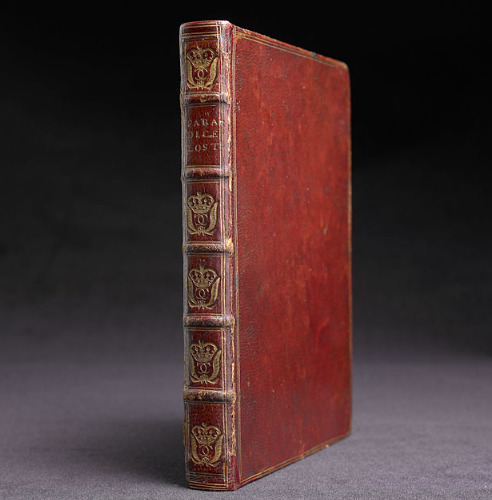
Per one Miltonian scholar: "The most single important event in Milton's life was the event against which he struggled most: the Restoration of Charles II, [and his relationship with the King]. Had it not come, we might have never had Paradise Lost...certainly, we should never have had [it] in [its] present power and significance."
Milton followed up Paradise Lost with Paradise Regained in 1671, three years before his death, with advice for King Charles II, urging the hedonistic Charles to "reign over himself and his passions":
"For therein stands the office of a King, His Honour, Vertue, Merit and chief Praise, That for the Publick all this weight he bears. Yet he who reigns within himself, and rules Passions, Desires, and Fears, is more a King; Which every wise and vertuous man attains: And who attains not, ill aspires to rule Cities of men, or head-strong Multitudes, Subject himself to Anarchy within, Or lawless passions in him which he serves." - John Milton, Paradise Regained, Book II, lines 463-472
To summarize: "If we must have a King back again, my Lord, please try to be a good man, unlike your father, who fell to his pride, [which was also the downfall of Lucifer]."
To quote another source: "Though the passage begins by noting that the office of a King is to bear the weight of public concerns, it is the control of one's private concerns that truly set a King apart as a virtuous character. Indeed, so important is self-command that any wise or virtuous man who attains it is like a king; any king who does not practice [self-command] is nothing more than a mere subject, ruled by anarchy and lawlessness."
Milton's words, too, echo a work written by Charles' grandfather, King James VI/I of Scotland and England: Basilikon Doron ("Royal Gift").
Per Wikipedia:
"'Basilikon Doron' (Βασιλικὸν Δῶρον) means 'royal gift' in Ancient Greek, and was written in the form of a private letter to James' eldest son, Henry, Duke of Rothesay (1594–1612). After Henry's death, James gave it to his second son, Charles, born 1600, later King Charles I. Seven copies were printed in Edinburgh in 1599, and it was republished in London in 1603, when it sold in the thousands.
This document is separated into three books, serving as general guidelines to follow to be an efficient monarch. The first describes a king's duty towards God as a Christian. The second focuses on the roles and responsibilities in office. The third concerns proper behaviour in daily life.
As the first part is concerned with being a good Christian, James instructed his son to love and respect God as well as to fear Him. Furthermore, it is essential to carefully study the Scripture (the Bible) and especially specific books in both the Old and New Testaments. Lastly, he must pray often and always be thankful for what God has given him.
In the second book, James encouraged his son to be a good king, as opposed to a tyrant, by establishing and executing laws as well as governing with justice and equality, such as by boosting the economy. The final portion of the Basilikon Doron focuses on the daily life of a monarch.
All of these guidelines composed an underlying code of conduct to be followed by all monarchs and heads of state to rule and govern efficiently. James assembled these directions as a result of his own experience and upbringing. He, therefore, offered the 'Basilikon Doron' ('Royal Gift') to his son, with the hope of rendering him a capable ruler, and perhaps to pass it down to future generations.
Overall, it repeats the argument for the divine right of kings, as set out in 'The True Law of Free Monarchies', which was also written by James. It warns against 'Papists' (Roman Catholics) and derides Puritans, in keeping with his philosophy of following a 'middle path', which is also reflected in the preface to the 1611 King James Bible. It also advocates removing the Apocrypha from the Bible."
King James VI/I further instructed his son and grandson:
"A good monarch must be well acquainted with his subjects, and so it would be wise to visit each of the kingdoms every three years."
"During war or armed conflict, he should choose old-but-good captains to lead an army of young and agile soldiers."
"In the court and the household, [a royal] should carefully select loyal gentlemen and servants to surround him. When the time came to choose a wife, it would be best if she were of the same religion and had a generous estate. However, she must not meddle with governmental politics, but perform her domestic duties."
"As for inheritance, to ensure stability, the kingdom should be left to the eldest son, not divided among all children."
"Lastly, it is most important...that [a royal] would know well his own craft...to properly govern over his subjects. To do so, [one] must study the laws of the kingdom, and actively participate in the council. Furthermore, [one] must be acquainted with mathematics for military purposes, and world history for foreign policy."
"[A royal] must also not drink and sleep excessively. His wardrobe should always be clean and proper, and he must never let his hair and nails grow long. In his writing and speech, he should use honest and plain language."
King James VI/I further supplemented Basilikon Doron with a written treatise titled The True Law of Free Monarchies: Or, The Reciprocal and Mutual Duty Between a Free King and His Natural Subjects.
"It is believed King James VI/I wrote the tract to set forth his idea of absolutist monarchism in clear contrast to the contractarian views espoused by, among others, James' tutor George Buchanan (in 'De Jure Regni apud Scotos'), [which] held the idea that monarchs rule in accordance of some sort of social contract with their people. James saw the divine right of kings as an extension of the apostolic succession, as both not being subjected by humanly laws."
Milton's own Areopagitica was a follow-up on De Jure Regni apid Scotos by George Buchanan, and also to The True Law of Free Monarchies, as well as the idea of the "divine right of kings". It takes its title in part from Areopagitikos (Greek: Ἀρεοπαγιτικός), a speech written by Athenian orator Isocrates in the 4th century BC.
Most importantly, Milton also wrote on the concept of free will: "Milton's ideas were ahead of his time in the sense that he anticipated the arguments of later advocates of freedom of the press by relating the concept of free will, and choice to individual expression and right."
The concept of free will, too, was a major topic explored in Paradise Lost. Per one source: "In 'Paradise Lost', Milton argues that though God foresaw the Fall of Man, he still didn't influence Adam and Eve's free will. [...] God specifically says that he gives his creatures the option to serve or disobey, as he wants obedience that is freely given [or chosen], not forced. Some critics have claimed that the God of the poem undercuts his own arguments; however, Milton did not believe in the Calvinistic idea of 'predestination' (that God has already decided who is going to Hell and who to Heaven), but he often comes close to describing a Calvinistic God. God purposefully lets Lucifer (Satan) escape Hell, and sneak past Uriel into the Garden of Eden, and basically orchestrates the whole situation so that humanity can be easily ruined by a single disobedient act. In describing the Fall of Man before it happens, God already predicts how he will remedy it, and give greater glory to himself by sending his Son [Jesus Christ] to die, and restore the order of Heaven."
In Hazbin Hotel, Adam also describes the Calvinistic idea of 'predestination', and that "the rules are black and white":

However, "This possible predestination leads to the theory of the 'fortunate fall', which is based on Adam's delight at learning of the eventual coming of the Messiah [from his bloodline]. This idea says that God allowed the Fall of Man, so that he could bring good out of it, possibly more good than would have occurred without the Fall, and be able to show his love and power through the incarnation of his Son. In this way, the free will of Adam and Eve (and Lucifer/Satan) remains basically free, but still fits into God's overarching plan."
However, there is one major flaw with this, and that is that we don't know if Jesus Christ exists within the Hazbin Hotel universe or not. Yet Charlie Morningstar, the daughter of Lucifer Morningstar and Lilith, and the "Princess of Hell", is depicted as a savior-esque figure within the show who, like God in Paradise Lost, encourages lowly sinners to choose obedience to God out of their own free will. More interestingly, Charlie does not come from Adam's bloodline; yet, while Lucifer decries 'free will', Charlie supports 'free will' instead.
Perhaps is is merely because Charlie, being the daughter of Lucifer and Lilith, claims to want to fulfill Lilith's "dream" of humanity being empowered in Hell ("The mind is its own place, it can make Heaven out of Hell, or Hell out of Heaven" - Lucifer, Paradise Lost); however, I think it also stems from Charlie having a genuine belief that 'free will', and people choosing to do good instead of evil, is "good" and "Godly".
True to Paradise Lost, this is also in fulfillment of God's plan; and, according to one fanfiction, why God allowed Charlie to be born to Lucifer and Lilith, so that sinners may be redeemed through Charlie.
For more on differing interpretations of 'free will', I suggest reading: "Free Will and the Diminishing Importance of God's Will: A Study of Paradise Lost and Supernatural" by Kimberly Batchelor (2016)
Excerpt: "'Paradise Lost' –and Milton’s purpose for writing the poem— is rooted deeply in postreformation Arminianism and this is apparent in its employment of free will. Chapter 1 argues that Milton turns to free will as a tool to justify the actions of God. Freedom of choice is God-given, and sets up a morality in which right and wrong are dictated by God. Chapter 2 shows that in 'Supernatural', free will is not given by a higher power; and, in fact, free choice functions as an act of defiance against God's will."
This raises the question: Is 'free will' given by God, using Lucifer as his vessel, in Hazbin Hotel, as in Paradise Lost? Or is 'free will' not given by a higher power; and, in fact, an act of defiance against God?
This brings us back around to our first question: Why is an apple, or 'malus', used to depict the "fruit of knowledge", especially if 'malus' means 'bad or evil', whereas Milton depicts 'free will' as God-given?
Well, for one, Lucifer still chooses to associate himself with apple symbolism and imagery, despite being skeptical of free will:
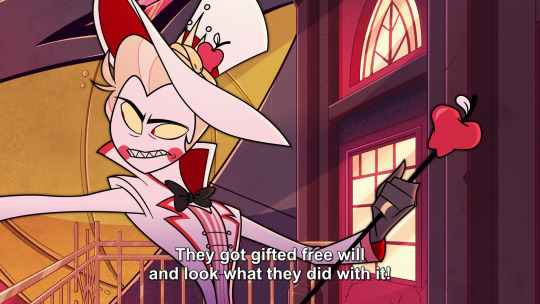
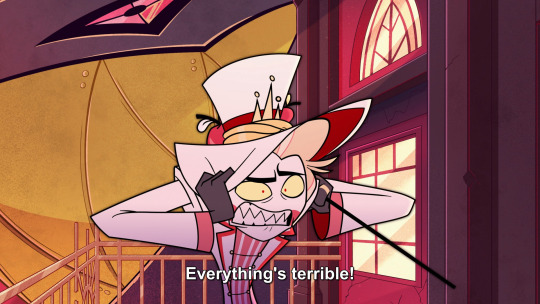
Based on the introduction to Episode 1, Charlie also views 'free will' as a gift (Miltonian), whereas Lucifer appears to view it as a curse.
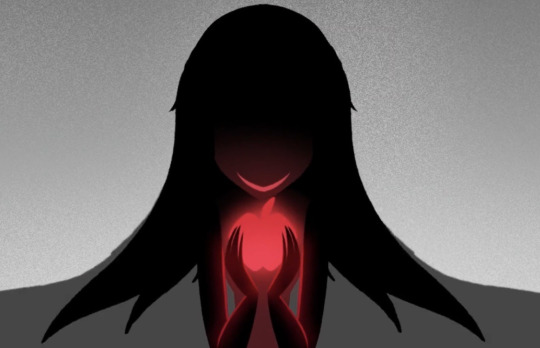
However, Charlie also notes that it was through the 'gift' of free will that the "root of all evil" entered the world, for if mankind could choose to be good, then they could also choose to be evil ('malus').
John Milton states in Paradise Lost: "Of Man's First Disobedience, and the Fruit Of that Forbidden Tree [malus], whose mortal taste Brought Death (evil, malus) into the World, and all our woe."
Thus, the use of an apple specifically is likely a tie-in to what others have been speculating about a character that series creator Vivienne Medrano (Vivziepop) alluded to a while back: "The Root of All Evil".
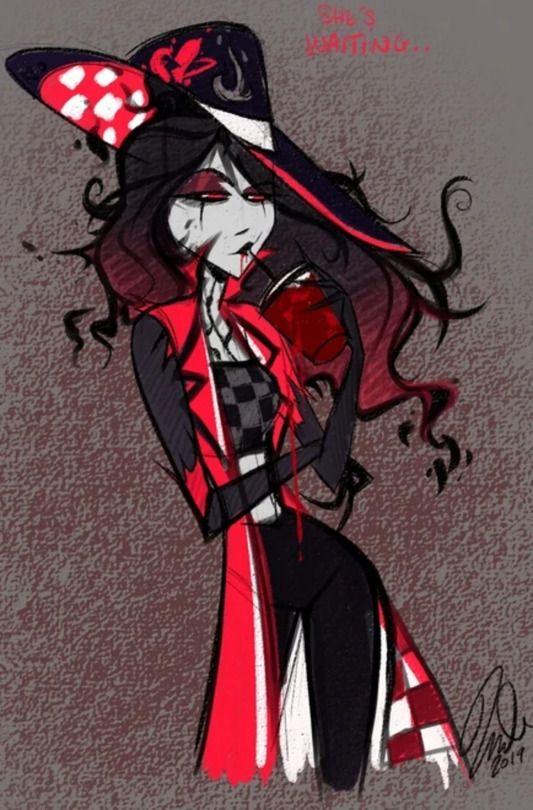
However, "Roo" itself is depicted as possessing the body of a human woman, presumably Eve, the first one to eat the "fruit of knowledge":
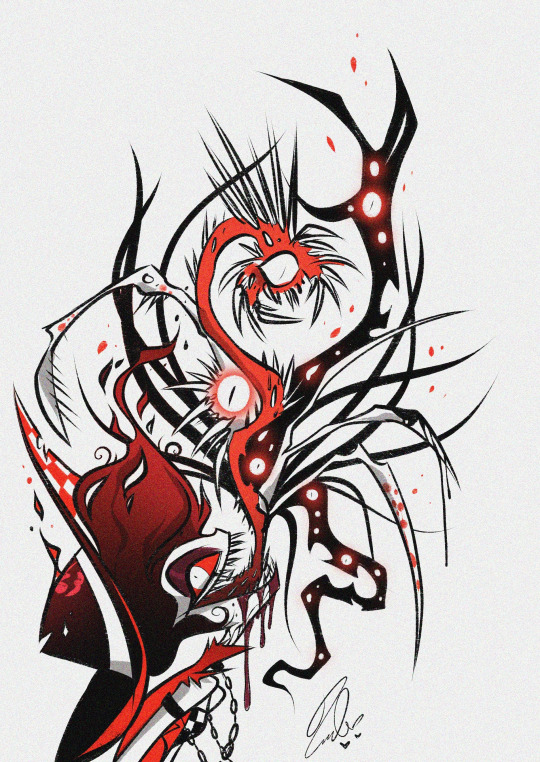
Thus, we can discern that "Malus" likely refers to this character. (Also see: "Maleficent", a name that also uses the root word "mal", "evil".) As for Roo's intentions, if Charlie is "good" - and, if, in fact, Alastor was sent by "Roo" (Eve) - then they may want for Alastor to work on their behalf to "corrupt" Charlie, or make sure the hotel never succeeds.
This is because demonic power is tied to human souls, and there are "millions of souls" in Hell, which likely fuels the great power of "Roo". The more souls there are in Hell, the more powerful "Roo" becomes. The Overlords also get their demonic power from "millions of souls".
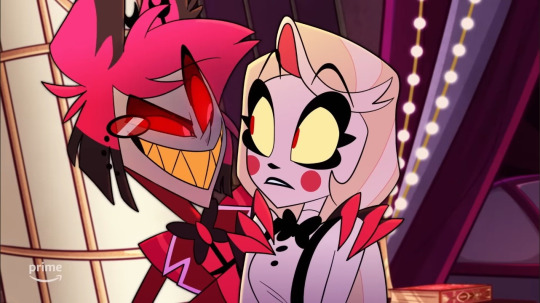
The deal between Eve and "Roo" might even be the first contract, or deal, between a human soul and a demonic entity; in exchange for 'free will', and the knowledge of good and evil, Eve allowed the "Root of All Evil" to inhabit her body, and to escape the void or prison it was confined to by Heaven (Hell?). (For one cannot be 'all-good' unless you attempt to 'eliminate' or 'ablate' evil; and, in Greek mythology, Zeus imprisoned the Titans in Tartarus for all of their evil deeds.)
Another possibility, brought up in an article by Gillian Osborne, is that Lucifer sees the "fruit of knowledge" as an apple, but it may appear as different fruits to different people, depending on how they view it. This also fits with Lucifer and angels being able to easily shapeshift.
In Paradise Lost, only Lucifer describes the fruit as an "apple" (malus), as he associates malus with "bad, evil", while the narrator also describes the fruit as "a mix of different colors" and peach-like. This then begs the question: "Did the fruit of knowledge of good and evil become 'evil' because Eve harbored resentment towards Adam?"
Quote: "Lucifer (Satan) gives Eve yet another hint that this tree may be more complicated than he wishes her to believe: although elsewhere in Milton's poem Eden is heady with its own newness, sprouting spring flowers left and right, the tree of knowledge is already old: its trunk is 'mossie'. Nevertheless, Lucifer claims to wind himself around the tree 'soon'; the quickness of his reported arrival stands in contrast to the timescales required to cover a fruit tree with moss (PL 9.589). Placing Lucifer's winding body between these two timescales—an easeful present and the inhuman scale of natural history—Milton suggests that there is something dangerous in entangling the past with the present. Yet, 'Paradise Lost' also makes deep biblical history feel like present politics for its readers. When Adam and Eve wander out of Eden at the end of the poem, they famously make their way not only into an earthly paradise, but also into the present. Eden's mossy apple tree therefore represents the pitfalls of conflating nature and history, of seeing any action in human history—even Eve's eating of an apple—as natural, if by nature, we mean inevitability. For Milton, history, unlike nature, is directed by humans, progressive, and, like the reading of 'Paradise Lost', hard work. While trees may inevitably collect moss the longer they live, Adam and Eve's labors in the garden, and our labors of reading, require agency and effort. Milton's poem refuses mourning the loss of Eden, [and the perfection of Heaven], in favor of a perpetual, melancholic, recreation of paradise: a present perfecting."
To quote Twisted: The Untold Story of a Royal Vizier, which also draws inspiration from John Milton's Paradise Lost: "It's an unfortunate situation...but you do have a choice [i.e. free will]."
#hazbin hotel#hazbin hotel analysis#hazbin#hazbin analysis#hazbin hotel meta#hazbin meta#hazbin hotel theory#hazbin theory#deep thoughts#john milton#paradise lost#eve hazbin hotel#lucifer hazbin hotel#lucifer morningstar#adam hazbin hotel#lilith hazbin hotel#lilith morningstar#roo hazbin hotel#root of all evil
260 notes
·
View notes
Text
"A blanket — not dusty — nested on the chair, and it was not difficult to imagine the shape of a young man sleeping in it. There was something unexpectedly lonely about the image." - The Raven Cycle Blue Lily, Lily Blue. when Adam finds out Ronan has been going to the Barns to dream.
an incoherent ramble
it's interesting how each one of these people. the very thing that sets them apart. the unique thing about them is what keeps them awake at night. it's what drives a wedge between them and the world. sth to think about. like ronan and his dreams. adam and cabeswater. gansey and glendower. blue and her gift and secret. noah and his half death. idk it's sorta heartbreaking...bc this thing is yours. it can't be any other way bc any other way will not feel like you or complete. but at the same time it makes you so different. like you'll always be apart from the rest of the world. makes me think even of me and all my most acute desires. my worlds and all i want. my words even. they keep me awake at night. drive me insane. make me unknowable at times. but they are or feel like they are quintessentially me. kinda sad huh? like this specific lyric i once read by paramore 'it is lonely being the holy one'... i don't even remember if that's how it goes...
but you can't help it. it feels right. they're your things, your values, your gifts, your desires, they're you... it's a double edged sword. through and through. you wield it. and it also cuts you...
#the raven cycle#raven boys#blue lily lily blue#blue sargent#noah czerny#ronan lynch#adam parrish#richard gansey#idk what this is#personal#incoherent rambles
18 notes
·
View notes
Text
things i've said to, or about, ronan lynch:
the raven boys:
not ronan looking at his trauma and the stagnation of his emotional growth and thinking "you know what this needs? a bird. specifically, a raven, the cuntiest of birds."
that man could not lie if his life depended on it.
the secret was you, oh my fucking god.
oh, baby.
is this flirting?
someone's jelly.
babe, no, driving is a terrible first date idea.
you know what, if parrish wasn't the true love of your life, you could've married gansey and be miserable and rich together, ronan.
there is nothing kinder than a creature who holds their heart in their hands, something that vulnerable must trust everything it meets.
he really said "noah, point and i'll fucking shoot, gimme a sec lemme dream up an ar 15."
jealously looks… scary on you, babe.
HELL YEAH, RONAN BEAT THE SHIT OUT OF YOUR BOYFRIEND'S ABUSIVE ASSHOLE DAD, it's okay, gansey'll pay the bail.
jesus christ, bro's in love enough to study.
ronan you are fucking insane and so am i, cause i laughed too.
ronan you little shit (fucking with blue in order to get her to break up with your bf is not the answer) (but also slay)
oh, my loverboy.
*laughs* you're fucking insane, ronan lynch.
the dream thieves:
me, stares at adam parrish, who works as a mechanic and then stares back at ronan lynch, who is obsessed with the taste of gasoline and is not subtle: well that's a coincidence
10/10 line, ronan.
he's just a good old fashioned loverboy.
gayyyy
actually so older sibling of you.
something, something, snake imagery, the bible, ronan's relationship to his faith, ronan's love for a boy named adam.
gotta love the catholic guilt.
kavinsky's right, bro, gansey would never kill his first husband.
i was wrong, gansey's gonna kill you, babe.
this is what makes you different from kavinsky.
blue lily, lily blue:
cabeswater: we love all ronans and non-ronans alike.
ronan lore goes crazy I FORGOT HE USED TO COMPETE IRISH JIG MUSIC.
ronan, you're going to make me cry.
oh, he def wants you, lynch.
ronan, you sweetheart. it's funny, it's the people who seem to care the least that loves the hardest, loves so loudly you can feel it under your skin even if you can't hear it.
of course ronan is a chaotic shopper, he's literally just choosing things based on vibes.
pushing your crush in a shopping cart at a grocery store parking lot is some a+ flirting, lynch.
you know what's the perfect second date? dreaming up the body of a child so you can frame the man who killed your dad as a kid killer.
ronan: cabeswater won't dare to let my bf get hurt, we're besties.
ronan lynch, collecting beings to worship.
ronan and blue are lovers in the same way, loud, undeniable, blades made to protect, but blades nonetheless.
it makes sense, though. a dreamer should be a little scared of the dark.
the raven king:
oh, baby. oh, my baby.
time for dad ronan and little shit opal.
SHE'S LITERALLY YOUR KID.
i love gay to the point of religious devotion.
jesus, he's better at latin than the rest of you, y'all gotta lay off ronan's latin.
he's so DAD what do you mean you put your daughter in boots that were hard to walk in to slow her down and make her easier to keep an eye on.
drama queen, i love him.
oh, i understand you so much right now, ronan lynch (i've been so much, all i want is to rest. let the sun set.)
THE OCEAN IS ON FIRE AND THE SKY HAS FALLEN.
i'm gonna cry.
i am losing my mind, i am actually losing it, cause what do you mean ronan sitting there, stuck in some kind of purgatory, waiting for orders from his king and adam won't leave him alone in his grief?
i'm dying, ronan lynch. you've taken something from me.
oh, my lovely.
is this like a kink thing? if so, you just gotta let me know.
JUST KILL ME WHY DON'T YOU.
your kid. just accept it already.
this dread, it's so strong. how can god die?
YEAH HE FUCKING FOUGHT.
kill me, kill me please, he's dying or something worse than dying and he's dreaming of flowers, of blue flowers, their flowers, kill me now.
this is what kings do. they ask. and they hope.
greywaren, maker, lover
21 notes
·
View notes
Text
The Hogwarts Gangsey
So I saw Pynch in Hogwarts Fanart and this pin and now I'm doing headcanons of the Gangsey in the HP universe bc why not? (Also, me rewatching HP 7.2 has absolutely nothing to do with this)
Obvious disclaimer but important nevertheless: I DO NOT support JK Rowling in any way, shape, or form. Liking Harry Potter was my only personality trait from ages 12 to 15, tho so I can't really let it go.
This is all over the place, so sorry in advance. Also, I make a lot of Marauders Fandom references, so be prepared to be confused if you don't really interact with that side of the random.
I personally don’t see Gansey in Gryffindor, but we're rolling with it because Maggie said so. Also, Blue is a Slytherin that was nearly sorted into Hufflepuff
instead of being obsessed with dead Welsh kings, Gansey has a thing for horcruxes. Hear me out on this: the whole reason he wanted to find the Glendower was because he died and was brought back to live. Now, let's say Gansey had a similar experience with this in the magical world (without dying tho, that's not how HP works) and he finds out about this dark magic that allegedly makes you live forever? Idk about you, but I would become obsessed with it
So since the Gangsey has Marauders dynamics, it is crystal clear that Gansey instantly had a crush on Blue like the first time he saw her (like James had on Lily, get it?)
and Blue was all annoyed bc 1) the Slytherin/Gryffindor rivalry, duh and 2) she really just found him annoying and prentious. Like this kid is walking around asking everyone about dark magic??? Not that Blue thinks she is normal, but Gansey is a different kind of weird.
I don't think Gansey would be like James tho and ask her out a million times. He would be just admiring her and annoying her at the same time, asking her about horcruxes and calling her Jane
Blue always rolls her eyes and ignores the question bc why would she have an opinion on horcruxes? UNTIL one day, after she realized she actually kinda likes Gansey (that's a thing for another time), she gives in and spills her thoughts on horcruxes, and Richard Campbell Gansey III WAS STARSTRUCKED.
Anyways, since Bluesey is out of the way let's focus on the Gangsey itself shall we?
Since they all were sorted into different houses it takes some time until they all become friends really. I would say they only really start hanging out halfway through fourth year
Ronan and Gansey are friends before even going to Hogwarts bc they were OG friends in the books as well, Gansey is still the only one the group that knew Ronan before his dad died and how he was a "nicer" person
Henry weirdly always looked up to Ganseys theories, and so he befriends him first in third year. Ronan is a little annoyed at that bc yk his father just died (idk when he died canonically in the books so roll with this) but Gansey is just really happy to have someone who listens to him and his crazy theories about dark magic
I forgot to mention but Ronan IS Irish, like he has a heavy accent and all (which Adam obviously thinks is super attractive)
And then Adam slowly befriends them as well because his father is a death eather, so Adam wants to know more about dark magic - why not turn to the weird Gryffindor kid who won't shut up about it?
Adam and Blue are dating at this point, so he drags her with him
And Noah befriended Blue in like first year because he is precious and loves Blue, so he also kinda ends up in this friendgroup
Adam and Blue's relationship is not as awkward as in trc (yeah, no, that would be pain) they just really have a loving Lily/Remus dynamic and thought it was love, but after like a year they realize it's just friendship and break-up
I also like the idea of Adam being Welsh like Remus is often headcanoned as and he is really ashamed of like his accent and his like "poor slang" because most Hogwarts students have a posh accent (a bit like Remus in All the young dudes, if you know what I mean)
That's why he likes Ronan's accent so much as well - Ronan doesn't give a damn about it and speaks without shame
Anygays, we're not deep-diving into Pynch bc that would make this already too long post even longer, but they get together in sixth year and tell nobody until seventh
It's not like their hiding it. Everybody (except for Blue) is just super oblivious and doesn't see how obvious it is that these two are going out
Blue and Ronan's friendship is as slow burn as in trc
They're just constantly arguing. Ronan is like really scared that Blue will hurt Gansey's feelings, and he shows it. Blue on the other hand has no glue why Ronan is being extra shitty to her, so she fights backs twice as much and yeah - let's just say they end up I detention (and the hospital wing) quite a lot because of hexing each other
But in seventh year they just click, after Blue and Gansey are sorta going out. Blue also gave Ronan the "If you hurt Adam I'm going to kill you"-speech and Ronan is like "bitch same" and they become besties instantly
Idk how to incorporate Noah's deadness here, bc like I said that's not really how the Wizarding World works
Maybe he is friends with a hogwarts ghost so everyone turns it into a joke like "Haha, Noah is like a ghost himself"? But not in a mean way if that makes sense?
Also I do like the idea of a Henry/Blue/Gansey relationship AFTER Hogwarts
Like Henry is really confused bc he thought he liked Gansey (he comes to that realization after seeing him interact more with Blue in year five/six) but suddenly he also likes Blue and he is not opposed to the idea of dating both? That sounds really confusing to me
Since everyone is so slowburn it just wouldn't fit into their Hogwarts timeline
But I can see the tree of them traveling around the world after Hogwarts just like in trc, so that's when Blue and Gansey also realise they like Henry
That's it for now. I have more ideas so I will probably post more about them in the future. I'm definitely planning on doing a whole Hogwarts Pynch post, but idk if I'll get to it.
#trc headcanon#hogwarts au#the raven cycle#gangsey#maggie stiefvater#richard campbell gansey iii#blue sargent#ronan lynch#adam parrish#noah czerny#henry cheng#pynch#bluesey
20 notes
·
View notes
Text
Exquisite Corpse
(Aka Whelk and K fuck nasty and Whelk barely thinks abt Noah at all while they do.)
(s/o to @alter-adam for reminding me to always be on that freak shit and post this on main)
Whelk sat in the front seat of his car, a bottle in a paper bag held slackly in his hand. The green number above the dashboard told him reproachfully that midnight had come and gone an hour ago.
Whelk paid it no mind. He was busy trying to talk himself into calling it a night so he could begin the process of sobering up and driving back to his shitbox apartment.
But hell, there wasn’t much to choose between his crappy car and his crappy apartment, and anyway there was only a little more left in the bottle.
He heard the whisper of tires on asphalt and light sandblasted his hidey-hole as a car turned into the parking light, throwing the detritus of his car’s interior into unflattering relief.
The parking lot’s only streetlight had been busted for months Necking teenagers?
Whelk frothed with hatred, hot and sick.
The other driver cut their engine, and Whelk was once more assaulted by the deafening shrill of cicadas. They left their headlights on, and everything was washed in harsh brights and harsh darks, a tv set with the contrast set way too high.
A figure got out of the other car. Whelk waited for the slam of a car door, but the newcomer left it hanging open.
He wondered belatedly if he was about to be mugged, or perhaps carjacked.
No. A quick look at the other car showed that it was a hell of a lot nicer than Whelk’s. Garish. Familiar, too.
Whelk only had a moment to let that final realization ping worryingly around his head before the newcomer was leaning up against his driver’s side door.
Whelk grudgingly rolled down his window.
Kavinsky was an assault on the eyes.
“Don’t you know it’s a school night, mister?”
“Is it?” Whelk mumbled. Shit. Well, it wouldn’t be his first time teaching with a hangover.
“Recognized the faculty sticker on your piece of shit car.”
Peevishness was burning a hole in Whelk’s gut. What was it with the Kavinskys of the world and their fetish for constantly reminding him of his fall from grace?
“You sleeping here or something?”
Whelk did not answer. He merely glared.
Kavinsky’s face split into a slow, insolent grin. “Did you really kill a kid?”
Had he really said that? A rill of sweat trickled down Whelk’s ribs. He couldn’t move, paralyzed.
“How—?” He rasped, but Kavinsky was laughing, a sound like a dog having a seizure.
“You really think I didn’t check this shithole out before I moved here? Your daddy loses everything and your best friend goes missing the same day? I bet the po-po held you as long as they could, but wherever you stashed that fucker they must not have found him yet.”
Whelk couldn’t speak.
“Now me,” Kavinsky was saying thoughtfully, “If I killed someone? For damn sure I wouldn’t stick around.” His New Jersey drawl was obnoxious in the closeness of the night. “I’d move to a different state. Down south, maybe, where no one had even heard the name Kavinsky.”
Whelk did not speak.
“‘Course some of these rich bitches in Henrietta make me look like white trash.” His Cheshire smile was a neat row of headstones in the dark. “What does that make you, mister?”
Does this make you white trash now?
Unsteadily, Whelk placed a hand on the handle of his door, and Kavinsky obligingly stepped back to let him open it. Whelk caught himself with a hand on the roof of the car.
He felt ragged, unshaven.
Dangerous.
Outlined in shadow against the oblique glare of the Mitsu’s headlight, Kavinsky looked sharp enough to cut him. The left side of his face slid sickeningly into darkness, and for a moment Whelk imagined Kavinsky stepping forward and throwing his face into indelible relief, crumpled up and ruined.
Czerny had made a noise like a stepped-on gerbil when Whelk had hit him. A squeal and a crunch.
Whelk wondered for a moment if he was gonna be sick.
“Hey, now,” Kavinsky was saying, and Whelk blinked his eyes open to see he had his hands fisted in the front of Kavinsky’s wife beater, the heavy gold chain at his throat draped across Whelk’s knuckles, cold and bright in the half-light. Kavinsky’s shirt was bunched up around his armpits, his back probably gritty with sweat and dirt, pressed up against the passenger side window of his masturbatory boyish fantasy of a car.
Whelk felt a slide of something near his hip and he tipped his head down, still not loosening his grip, and saw Kavinsky lifting his worn-bald wallet from his pocket with two fingers.
Thief.
One-handed, Kavinsky flipped open Whelk’s wallet. With his teeth, he drew forth the foil-wrapped prize of his conquest.
He tossed the wallet at Whelk’s chest, and Whelk wasn’t fast enough to catch it. It landed in the dust at his feet.
Straightening up, he found Kavinsky draped over the hood of his car, not looking at him, the condom held up between his fingers.
There was something wrong about it, the closeness of the sultry air, the smell of tar off the parking lot, the impenetrable charcoal gray of the night so violently penetrated by the Mitsu’s anti-glare headlights.
Kavinsky’s skin was waxy and sunken, the dip between his shoulder blades disconcertingly obvious. He looked like a corpse. Still essentially a person, just missing that one little thing that made it tick.
Whelk was half-hard.
He was going to be sick.
His fingers found the condom, and after a moment’s fumbling, gave up and tore it open with his teeth.
He had the wherewithal to know he ought to do something to prepare them both, but couldn’t quite bring himself to lay hands on the body beneath him. He spat, and let the thick glob of it dribble from his lips down the clef Kavinsky’s boney ass. Kavinsky shuddered, maybe at the sound, maybe the unpleasant texture of Whelk’s spit. Maybe merely in anticipation of what was about to happen.
It didn’t matter to Whelk. He planted his hands flat against the hood of the Mitsubishi on either side of Kavinsky’s body, metal still warm under his hands.
The first shove made him gasp.
Whelk couldn’t see it in the dark, but faced away from his Latin teacher, Kavinsky opened his mouth and took his gold chain between his teeth to stop it hitting against his chest. He was grinning in triumph, head muddy as pond water, quiet on the surface, quiet underneath.
And if the name Whelk gasped when he came sounded more like “Noah” than “Joey”—? Well, what of it?
#whelk/kavinsky#kavinsky/whelk#idk if they have a ship name#czelk#noah czerny#in absentia#barrington whelk#joseph kavinsky#trc fic#trc#the raven cycle fanfic#the raven cycle#so it is written#posty mcpostface
12 notes
·
View notes
Text
yeah fuck it i'm making this its own post. basically very long winded (but still not as extensively detailed as i'd like) thoughts on adam & ronan (sort of) & whelk & noah
i remember reading the raven boys back in 2014 (ten years of rot in my brain!) and being sooo disappointed that there was basically zero fandom interest in whelk & noah beyond "omg whelk is evil and awful and terrible, poor baby noah!" when that is not the narrative surrounding them, not really. i feel it's a disservice to both of their characters to do that, especially noah's:
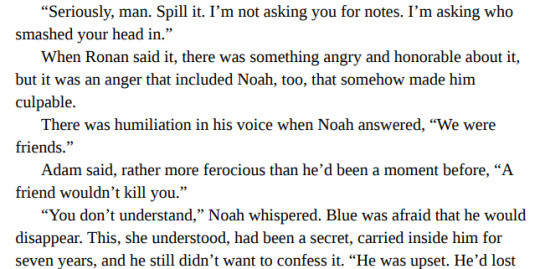

there is nuance there. there are implications. like... it's ALL about the implications!!! we basically see nothing of whelk and noah beyond what's left after the carnage. and it's a theme in trc for characters to have irreparably changed before we ever meet them (gansey, ronan, whelk, noah). we don't know what they were actually like when noah was alive, when they were best friends. when they were tight as ticks.
what we do know is this: whelk was noah's gansey. whelk was cheating on his own girlfriend with noah's, which is a shitty thing to do for sure, but something we also have zero context for. we also don't know how true it is, because whelk has such a self-inflicted warped view of his past. he keeps rewriting his own memories to think lesser of noah, because his absence hurts that much! we know they were best friends, the same way adam & ronan are best friends with gansey. we know they did everything together
okay, changing gears a little.
i'll paste the part where adam is possessed, sorry for the amount of screenshots:

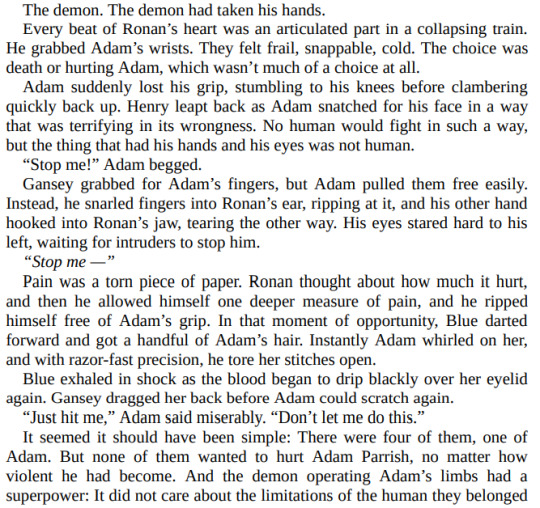
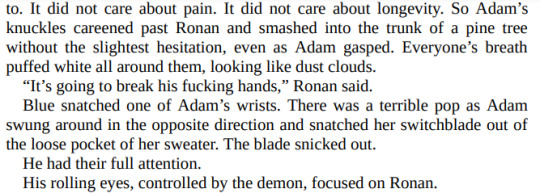
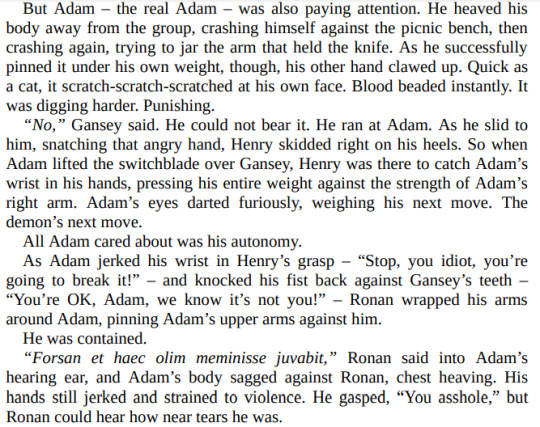
and this line from a bit further along the chapter:

then, from noah's possession scene:
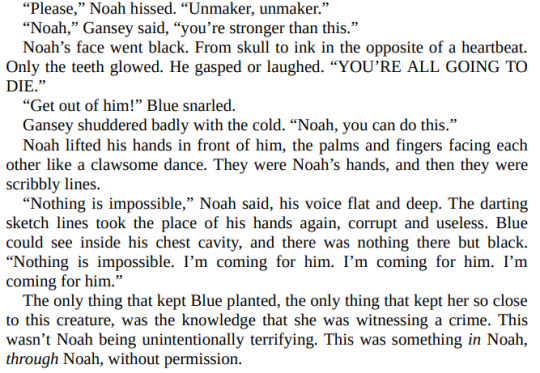
compare this to whelk's recollection of killing noah, and the effects it had on him:
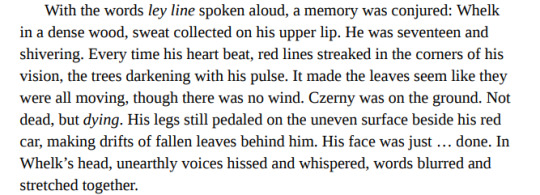
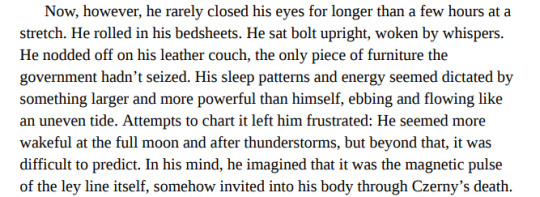
"red lines streaked in the corners of his vision" "in whelk's head, unearthly voices hissed and whispered, words blurred and stretched together" "dictated by something larger and more powerful than himself" "somehow invited into his body through czerny's death" yes i am going there, yes i am making that point. i think, to some extent, barrington was possessed when he murdered his best friend. neither noah nor adam get their own pov while possessed, so...
i mean, time is a circle. noah needed to die so that gansey would live. noah had already died, gansey had already lived. it needed to happen, and so it would.
where the difference lies, i think, is in barrington's reaction to being possessed, versus adam/noah. for all that i'm arguing possession, i don't think barry's a stand up guy, he's a kid who's never had good role models (need i pull out the quotes about his shit parents) and who was raised by money and objects and reputation, which is why i think the possession worked. the idea to kill noah might've seemed like his own in the moment, an escalation of the situation he was already in, but unlike adam/noah there was no one to hold him back (not to mention barrington isn't as familiar with magic things(?) as they are). in that moment, whelk did truly lost it. he did the unforgivable. but there is no universe in which he doesn't.
for every time we see noah reenacting his death, we also need to imagine barrington whelk, seventeen and shivering. realizing as he's committing the act that he can't go back. perhaps realizing too that he couldn't stop his hands from gripping onto that skateboard, no matter how much he wanted to after that first hit. ("But instead, he remembered the sound Czerny made the first time he hit him.")
there's also adam in this. both him as a parallel to barrington, and as a strange sort of part of noah in a way. adam and noah interact the least out of the main group, arguably, but they too are a two-headed creature; they started out as one singular character and you can sort of tell. something something hands and eyes, something something sacrifice. ronan sort of parallels noah, in that he is not the same lively person we hear about, and he never will be that person again. both are cabeswater personified (although in different ways).
some more things:
"he once had been tight as ticks with his roommate czerny" "only whelk and czerny, treasure hunters and troublemakers" "it was possible that czerny's death wasn't for nothing after all" "[...] his days a ribbon floating aimlessly in water" (in relation to: "he had been a swimmer himself, once") "czerny, you're in a better place than me, i think" "whelk, standing in the wreckage of his life, didn't laugh this time" "the dry, half-eaten burger on the passenger seat / the first fast-food burger he'd had in seven years" "these days, when whelk was trying to comfort himself, he told himself that czerny was a sheep, but sometimes he slipped and remembered him as loyal instead" "[...] took him back to that moment, the skateboard in his hands, the sad question gasped in czerny's dying sounds "we were friends like —"
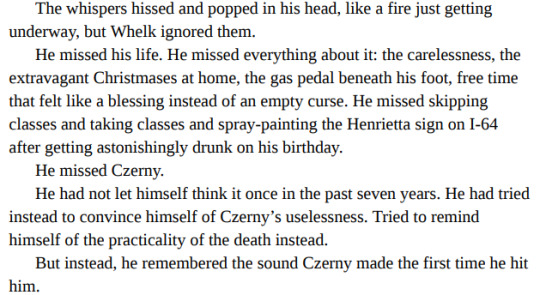
also, whelk dying in the same place noah did. these lines:


both noah and barrington look the same in the end. broken, rumpled, forgotten. noah's family will never know his bones were reburied outside of their family plot. whelk's mother, however distant she is, will never be notified that her son has died. i think in a way barrington died at the exact same time noah did; something something invited into his body through czerny's death.
basically what i'm getting at is, noah and barry could've been ronan and adam i think, had the circumstances been different. they never will be, but i think about it sometimes.
and there's so many more things i'm not even gonna TRY going into, like noah and whelk both being parallels to gansey (the three of them kings in their own right), or the disparity between whelk talking about czerny vs adele talking about noah, or whatever the fuck is going on with whelk's backstory in general (what's the deal with his mother? how the hell did he get the aglionby job? a random headcanon of mine is that his and noah's search for the ley line lead them to fox way, seven years before the events of the book, and that's partly why whelk refuses to give out his name to maura, because barrington is hard to forget, and easy to trace back)
there is so much to talk about here and i'm so peeved no one is doing it properly... why are we still talking about declan bringing his weekly girlfriend over to monmouth for no reason when we could be talking about whatever the fuck kinda soul-fate-destiny bullshit noah and whelk have!
#i know trc has its villain of the book thing but i am sooo disappointed whelk is never really talked about beyond#the first novel. like he's one of the only tangible links we have to noah's life... he was RIGHT THERE#he's so interesting to me. i rotate him and noah over and over in my head like they're in a microwave#trc#the raven cycle#the raven boys#noah czerny#adam parrish#barrington whelk#ronan lynch
86 notes
·
View notes
Text
anyway to weigh in on the yellowjackets:raven cycle. yes of course gansey would be first to die á la jackie. he would have a fight with adam where he was obnoxious about class in a way that got everyone to side with adam when adam sent him out in the cold. they would have the same deal with a pyre cooking the body but i actually think blue would start salivating first because in the wilderness context the sensible creature inside blue would think it more disrespectful to waste gansey’s meat. with her on the side of cannibalism analytic and occasionally cruel adam would turn next. henry would also go with adam and blue with little fanfare and ronan would take more convincing but i think adam would take the gansey persona and bring ronan to heel about it and they’d end up with a real toxic little dynamic for a while. of course just these five plus noah is a tiny plane crash so there would be more side characters to fill it out. possibly i’d even put kavinsky in there and i’d still have gansey die first and adam bring ronan to heel but then ronan would crash out with k later ultimately leading to k’s death and also finally getting him out of the toxic adam dynamic and if he gets back with adam after k it’s with a slightly different balance of power. anyway but that’s my breakdown of how i’d play that first death with the trc cast.
12 notes
·
View notes